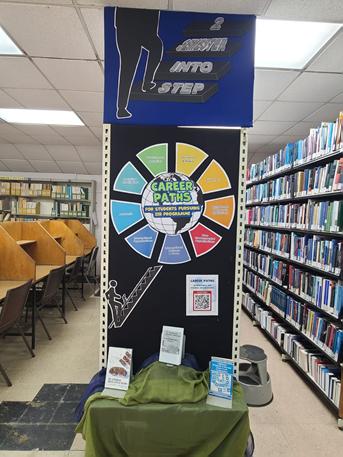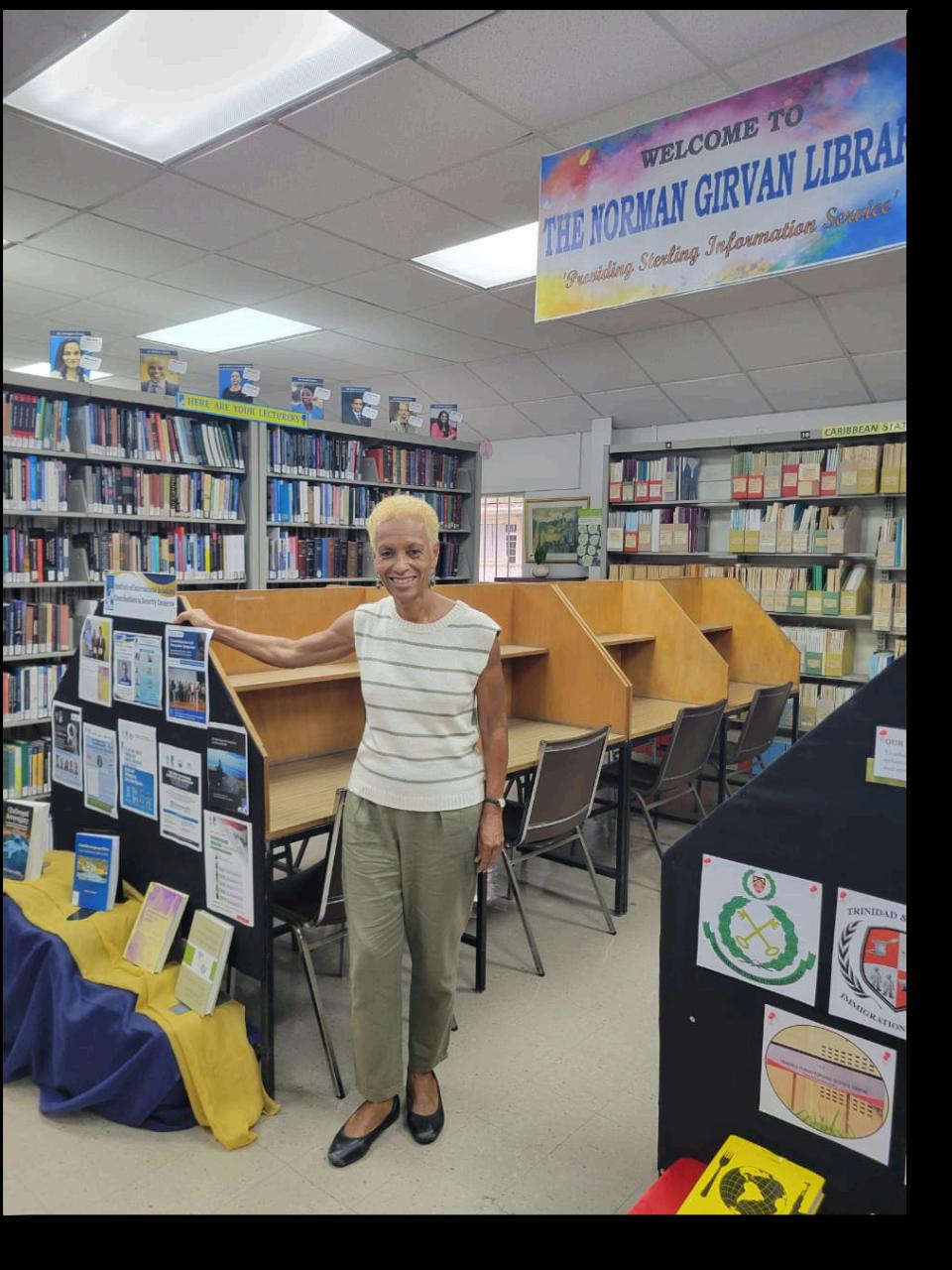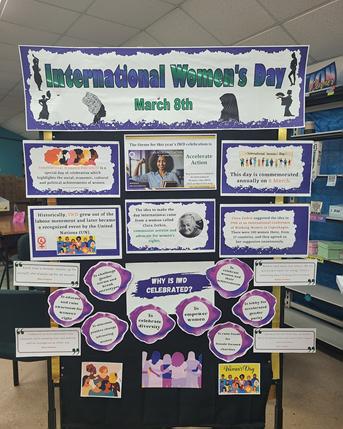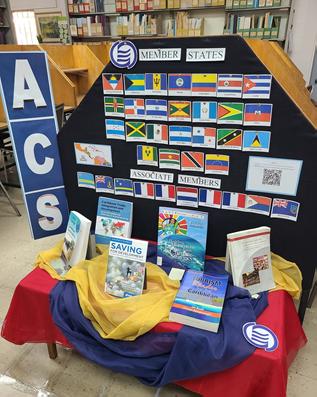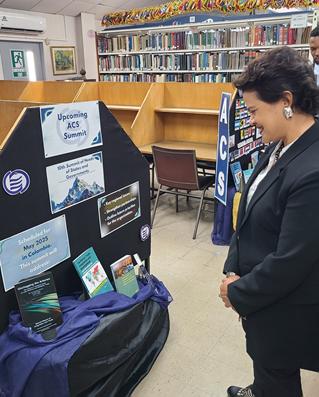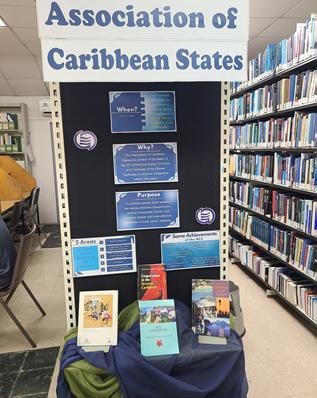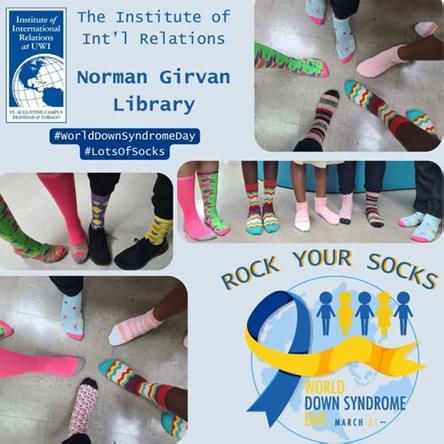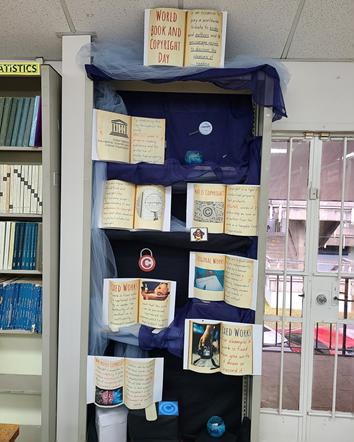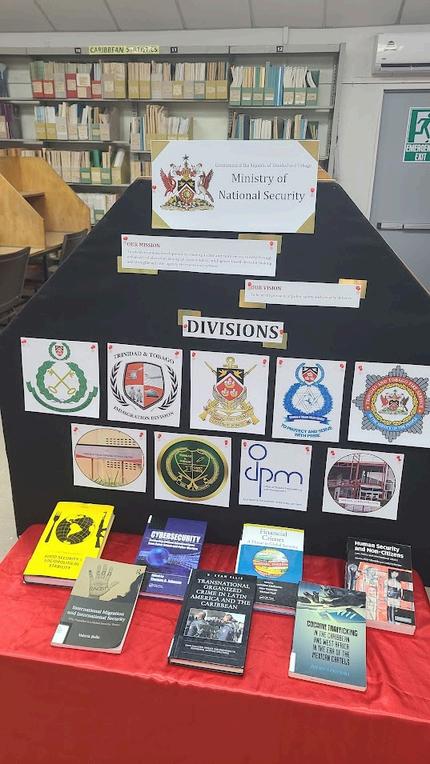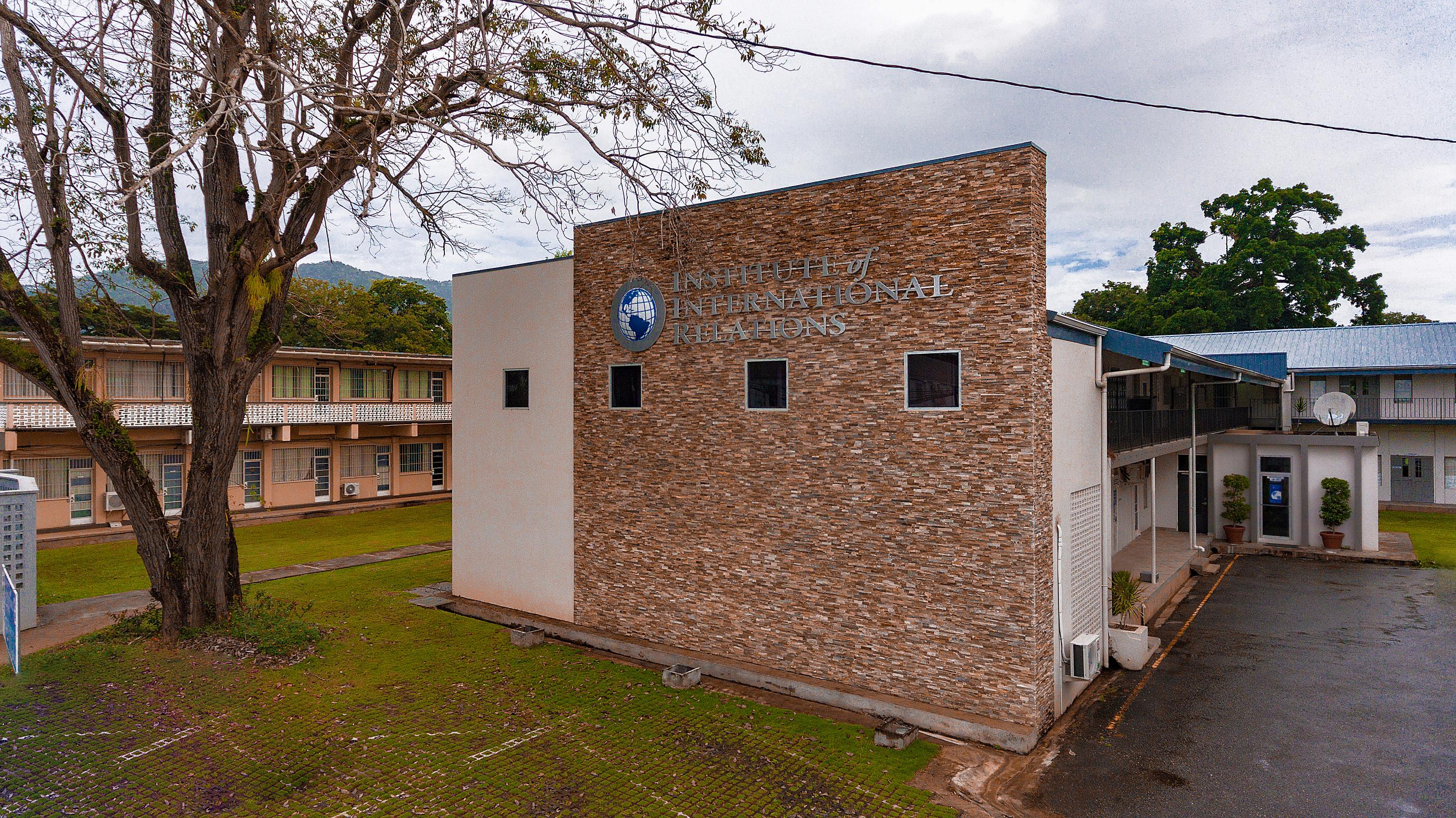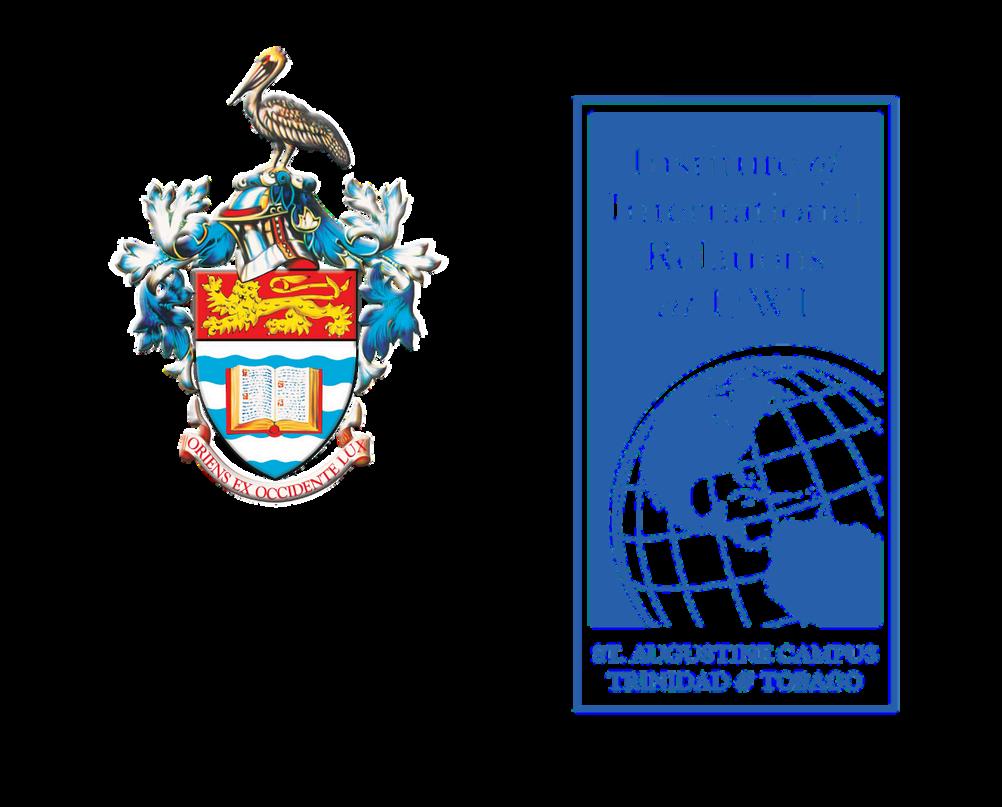

IIRToday
CRIME REDUCTION AND PREVENTION SYMPOSIUM
Towards Improved Public Security:
Crime Reduction and Prevention Through the Lenses of the Private Security Industry and Law Enforcement Agencies in Trinidad and Tobago.
The Crime Reduction and Prevention Symposium was the culmination of five months of extensive preparation, involving hundreds of meetings, thousands of work hours, and the coordination of over 800 files. The process also included the exchange of countless emails and persistent follow-ups with stakeholders, all of which contributed to making the event a remarkable success.
This initiative offered an in-depth learning experience that touched on organisational dynamics, interpersonal relationships, and emotional resilience. Coordinating multiple moving parts into a seamless, actionable structure proved to be a unique and rewarding journey. The sentiment expressed by Charles Bukowski, "if you’re going to try, go all the way" aptly captures the spirit of commitment that drove the project forward.
The Institute wishes to express sincere thanks to the event’s partners: the Trinidad and Tobago Private Security Association (TTPSA) and the Greater Tunapuna Chamber of Industry & Commerce, whose collaboration was instrumental in bringing the Symposium to life
The support of sponsors was equally vital
Special thanks are extended to:
The Quantum Foundation
The Weekend Caterer
CARICOM IMPACS
Fortress Security Services
CML Online
Inter-American Development Bank
Kiss Baking Company
AMCHAM T&T
Angostura Limited
Blue Waters Products Limited
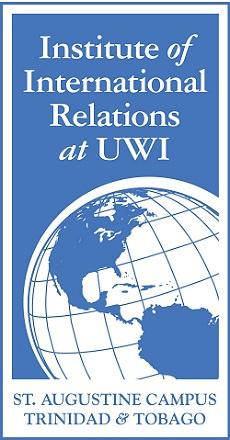
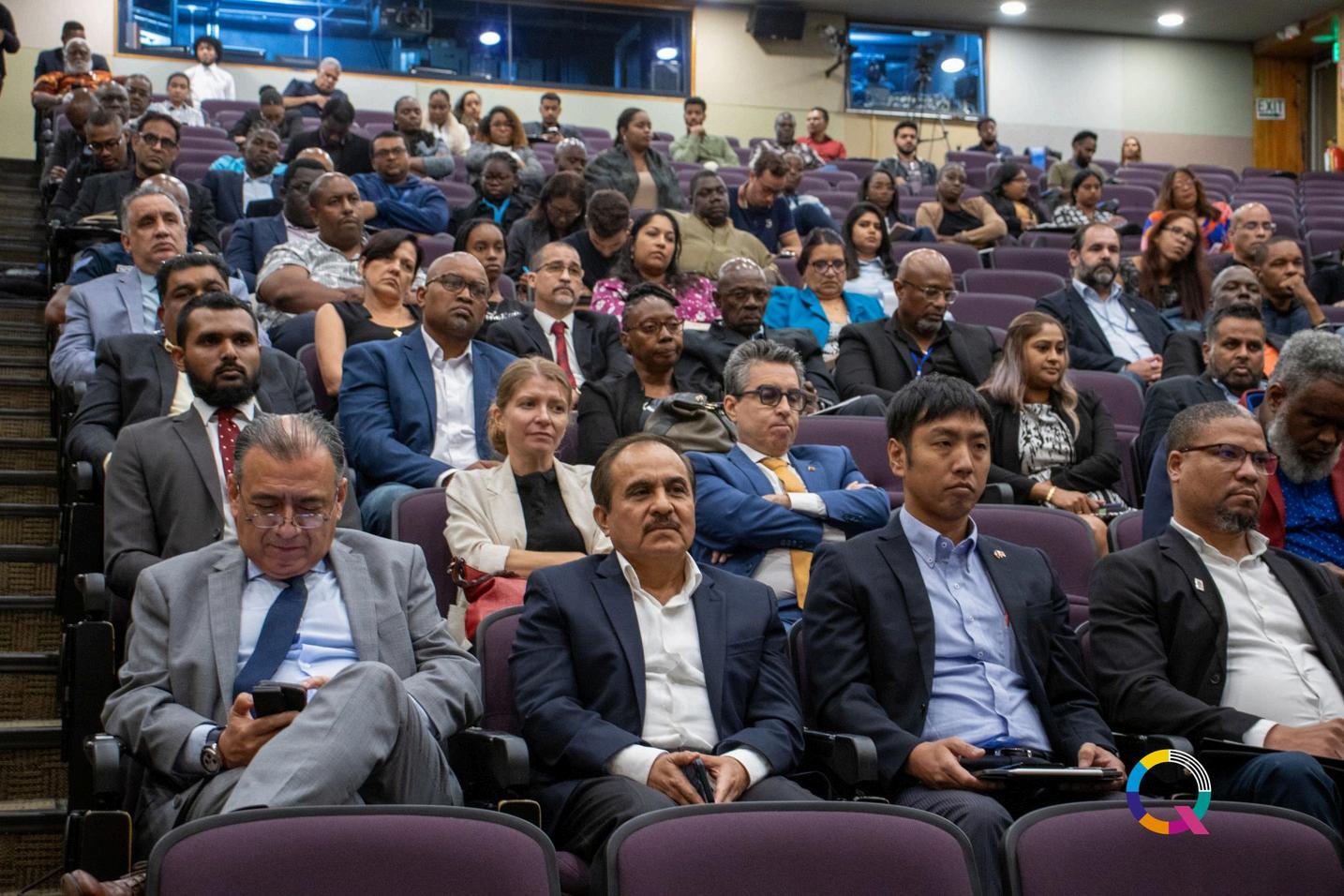
Snapshot of the attendees
Caption for the photo below:
[Centre] Minister of National Security, The Honourable Fitzgerald Hinds alongside other attendees [L-R] Mr Carlos Neptune Chairman of the Trinidad and Tobago Private Security Association (TTPSA), Moderator Ms Alana Wheeler, Mr Callixtus Joseph Assistant Director Policy Strategy and Innovation at the CARICOM Implementation Agency for Crime and Security (IMPACS), ACP Richard Smith Head of Operations, TTPS, Professor Derek Chadee Vice Principal of The UWI St Augustine, Dr Acolla Lewis Cameron Dean of Faculty of Social Sciences, Dr Michał Pawinski Lecturer Programmes Coordinator Institute of International Relations, Dr Annita Montoute Acting Director of the Institute of International Relations, Nirad Tewarie CEO of the American Chamber of Commerce of Trinidad and Tobago and Ms Krystal Seecharan, IIR Alumna (MC)
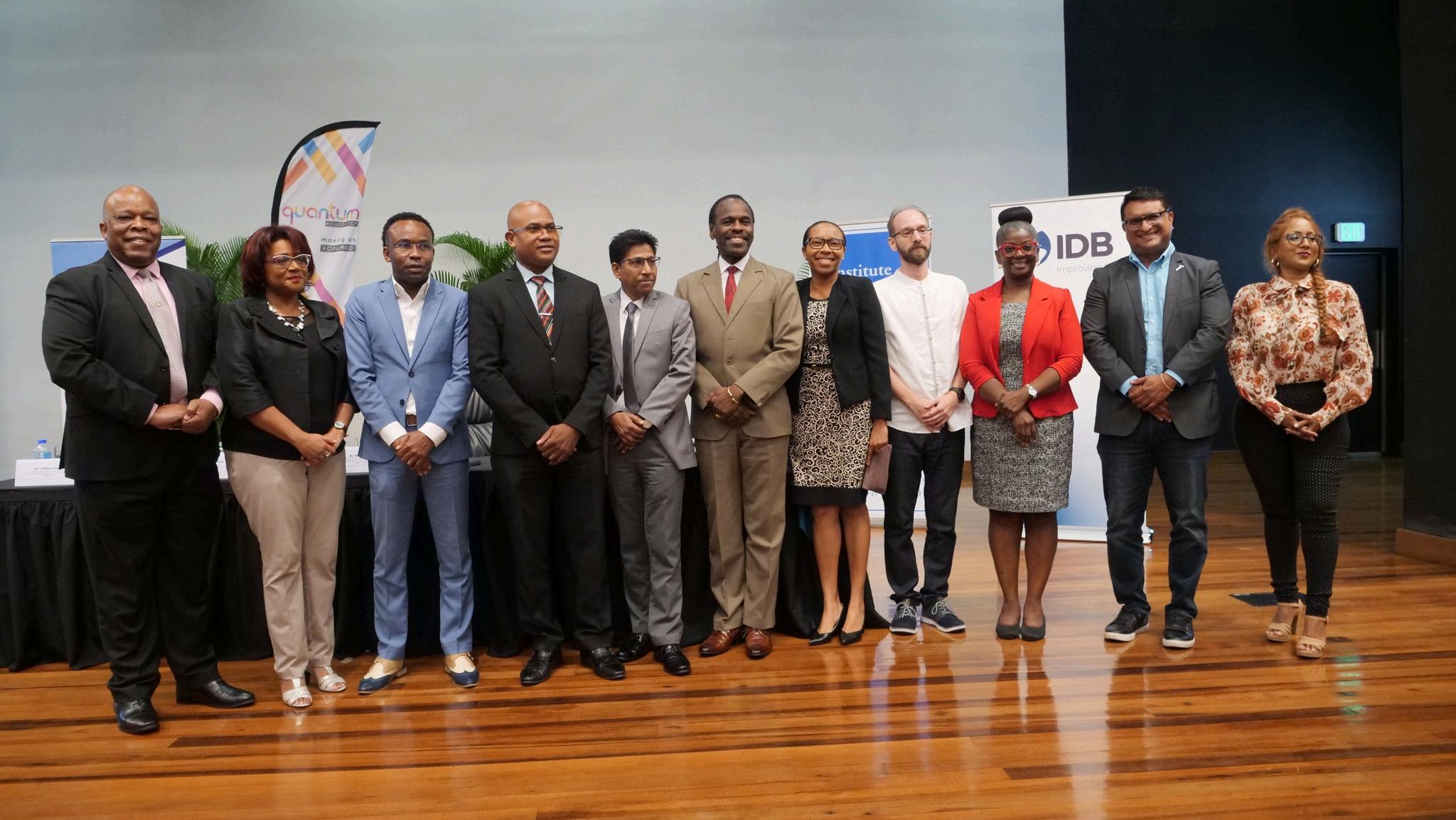
EDITOR’S NOTE
Welcome to our latest issue! Our cover story takes you inside the 'Crime Reduction and Prevention Symposium,' a pivotal event hosted by the UWI Institute of International Relations in February 2025. This symposium wouldn't have been possible without the crucial collaboration of the Trinidad and Tobago Private Security Association (TTPSA) and the Greater Tunapuna Chamber of Industry & Commerce, whose assistance was instrumental in its success.
You'll also discover compelling and current think pieces on international relations from our students and alumni, whose voices offer fresh perspectives Their submissions are a testament to their deep understanding and engagement
We've also compiled a vibrant overview of the UWI Institute of International Relations' activities from January to June 2025, demonstrating our ongoing efforts in student development and community engagement
Finally, we extend our gratitude to the Library Team, whose creative flair shines brightly within these pages, and to Mr Michael Woods-Patino, for his versatile Spanish expertise
We hope you enjoy this issue!
Warm regards,
Dionne Spears-Frontin
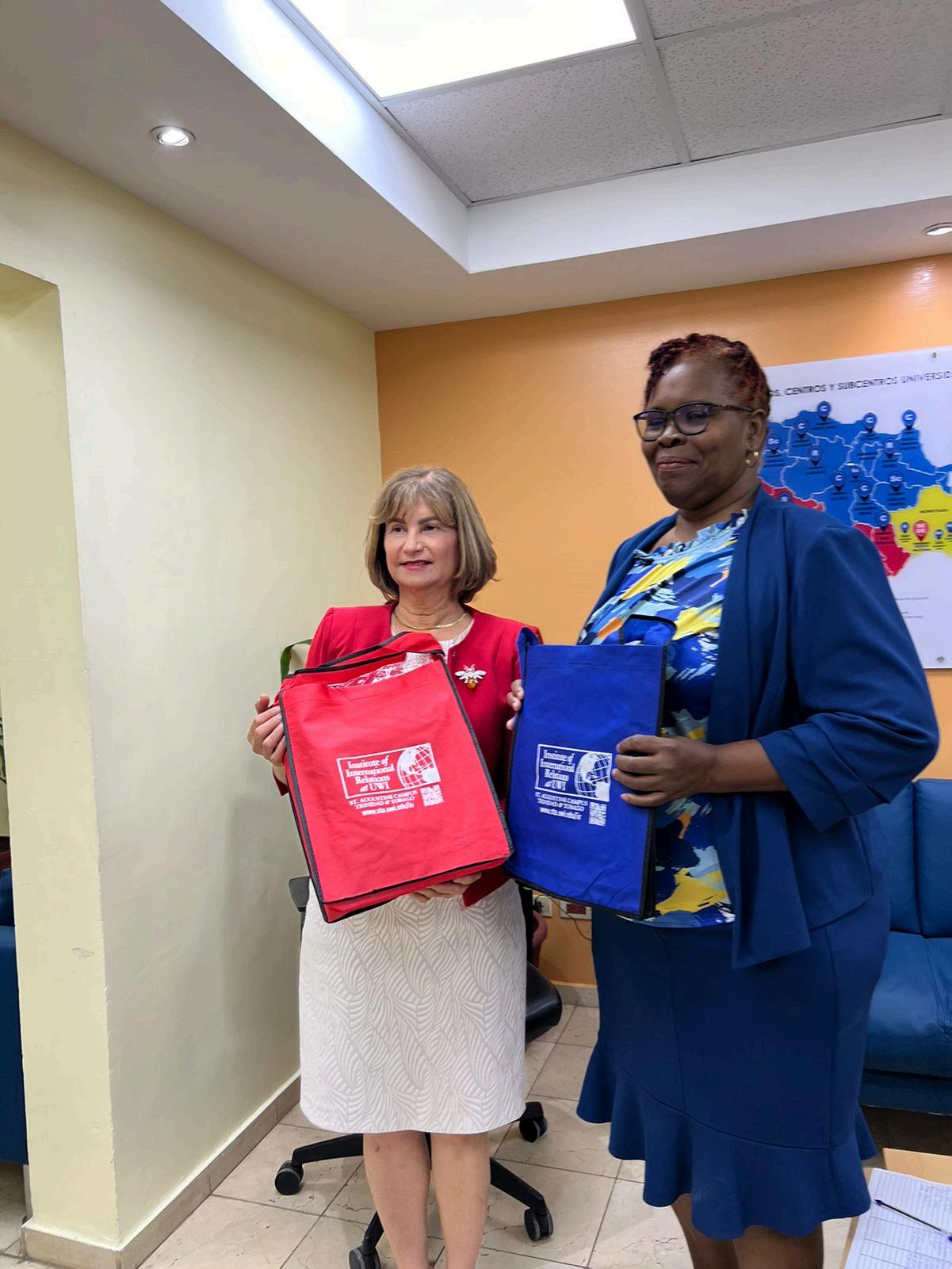

EDITORIAL COMMITEE

ManagingEditor Librarian,NormanGirvanLibrary
Editor
LibraryAssistantIII,NormanGirvanLibrary
Editor
LibraryAssistantII,NormanGirvanLibrary
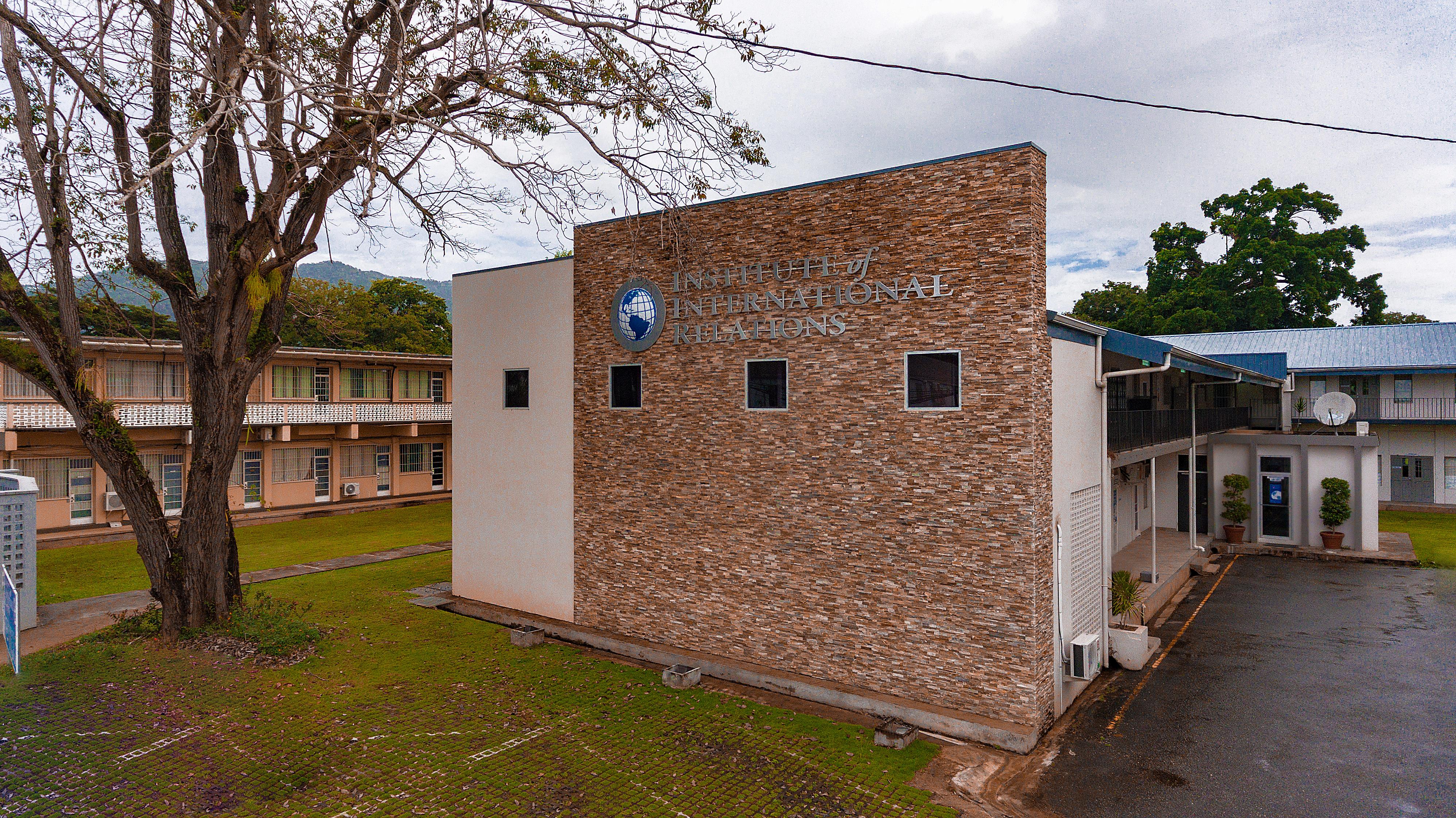
IIR’S DIRECTORSHIP
The Institute marked a transition on March 31, 2025, as we said goodbye to Dr Montoute in her capacity as Acting Director We are deeply grateful for her leadership during her time at the helm and for her significant contributions in emphasising the critical role of international relations Simultaneously, we're pleased to welcome, Dr Dave Seerattan, who assumed the role of new Acting Director on April 1, 2025 We warmly welcome Dr Seerattan and eagerly anticipate collaborating with Dr Seerattan and providing our full support as he leads the Institute in this interim period
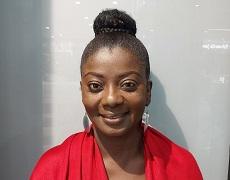
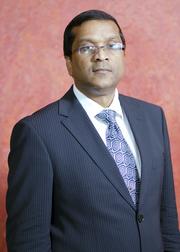
CRIME REDUCTION AND PREVENTION SYMPOSIUM
continued from page 1
On February 13, 2025, the Institute of International Relations (IIR) at The University of the West Indies (UWI) hosted a pivotal symposium titled “Towards Improved Public Security: Crime Reduction and Prevention Through the Lenses of the Private Security Industry and Law Enforcement Agencies in Trinidad and Tobago.” Held at the Daaga Auditorium in collaboration with the Trinidad and Tobago Private Security Association (TTPSA), the Greater Tunapuna Chamber of Industry and Commerce (GTCIC) and the American Chamber of Commerce of Trinidad and Tobago (AMCHAM T&T), the event spotlighted the growing need for coordinated national security efforts
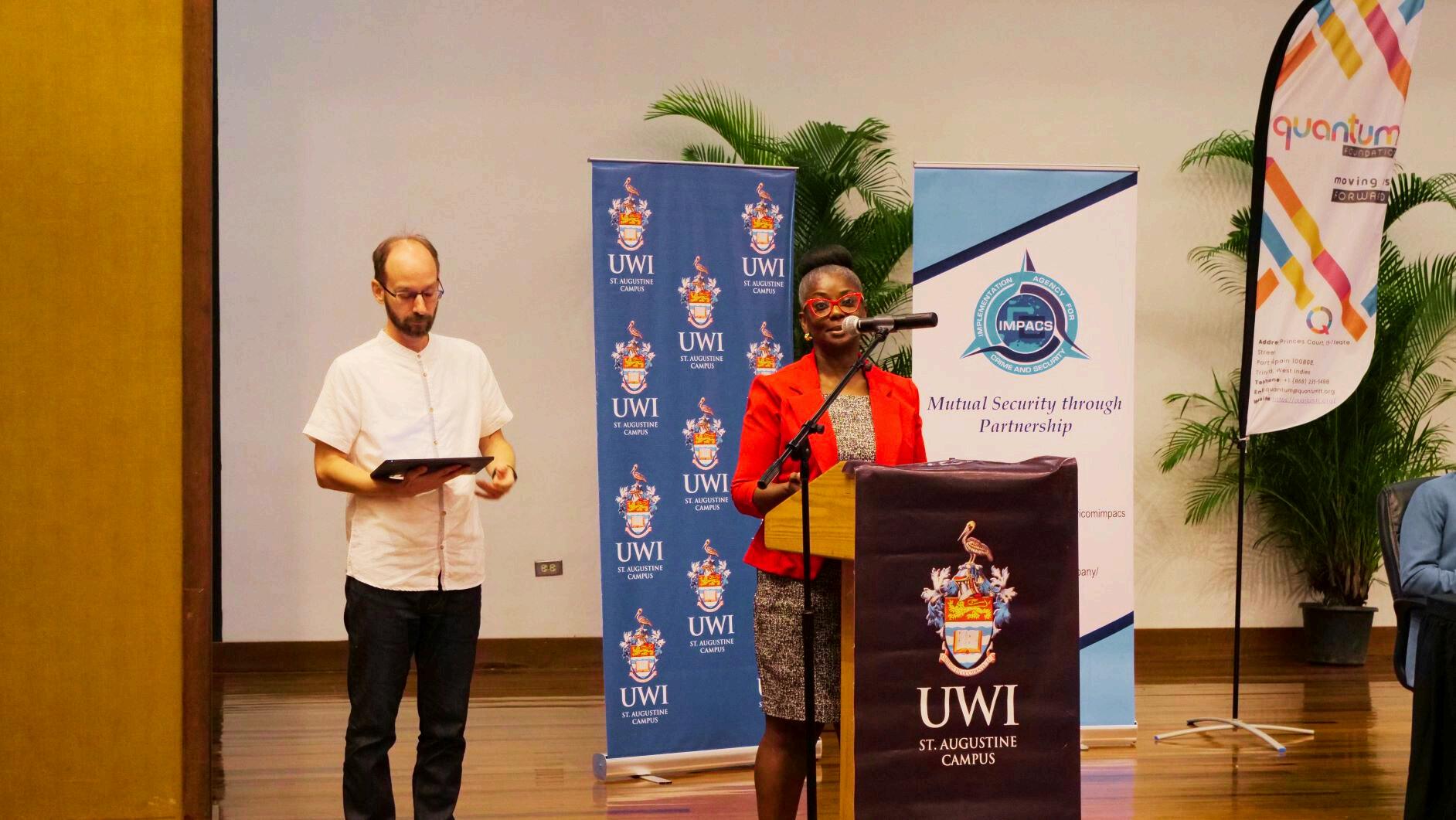
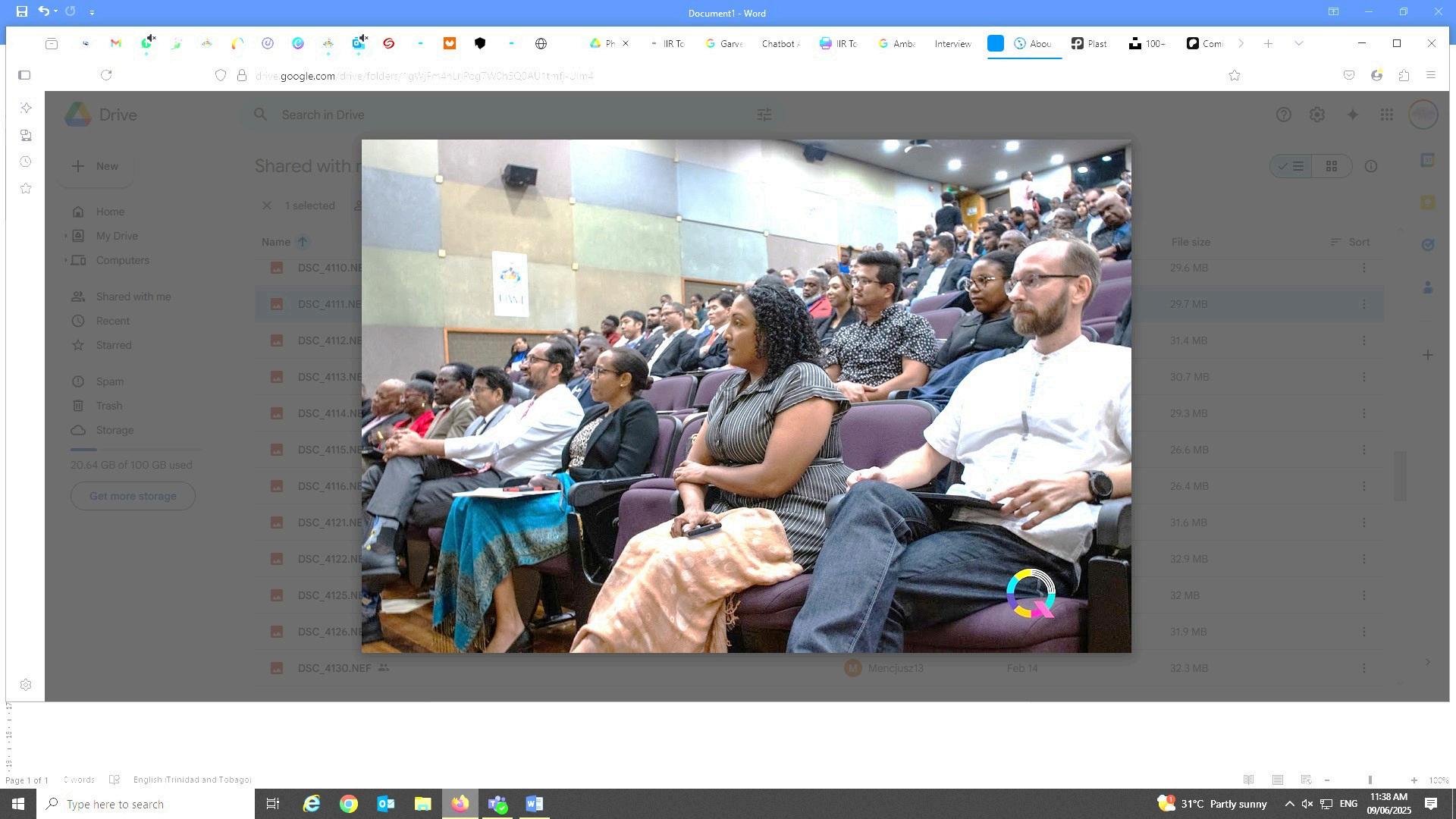
CRIME REDUCTION AND PREVENTION SYMPOSIUM
continued from page 3
A key insight was the stark imbalance between the private security sector boasting over 50,000 officers and the 6,500-member Trinidad and Tobago Police Service (TTPS) This gap emphasised the need for regulatory oversight, standardised training, and stronger public-private partnerships
Opening remarks from Professor Derek Chadee, Deputy Principal of UWI St Augustine, stressed that crime is not solely a policing issue, but a national challenge requiring a unified response Dr Annita Montoute, Acting Director of the IIR, framed the symposium as part of IIR’s commitment to public engagement and regional development through research-driven dialogue
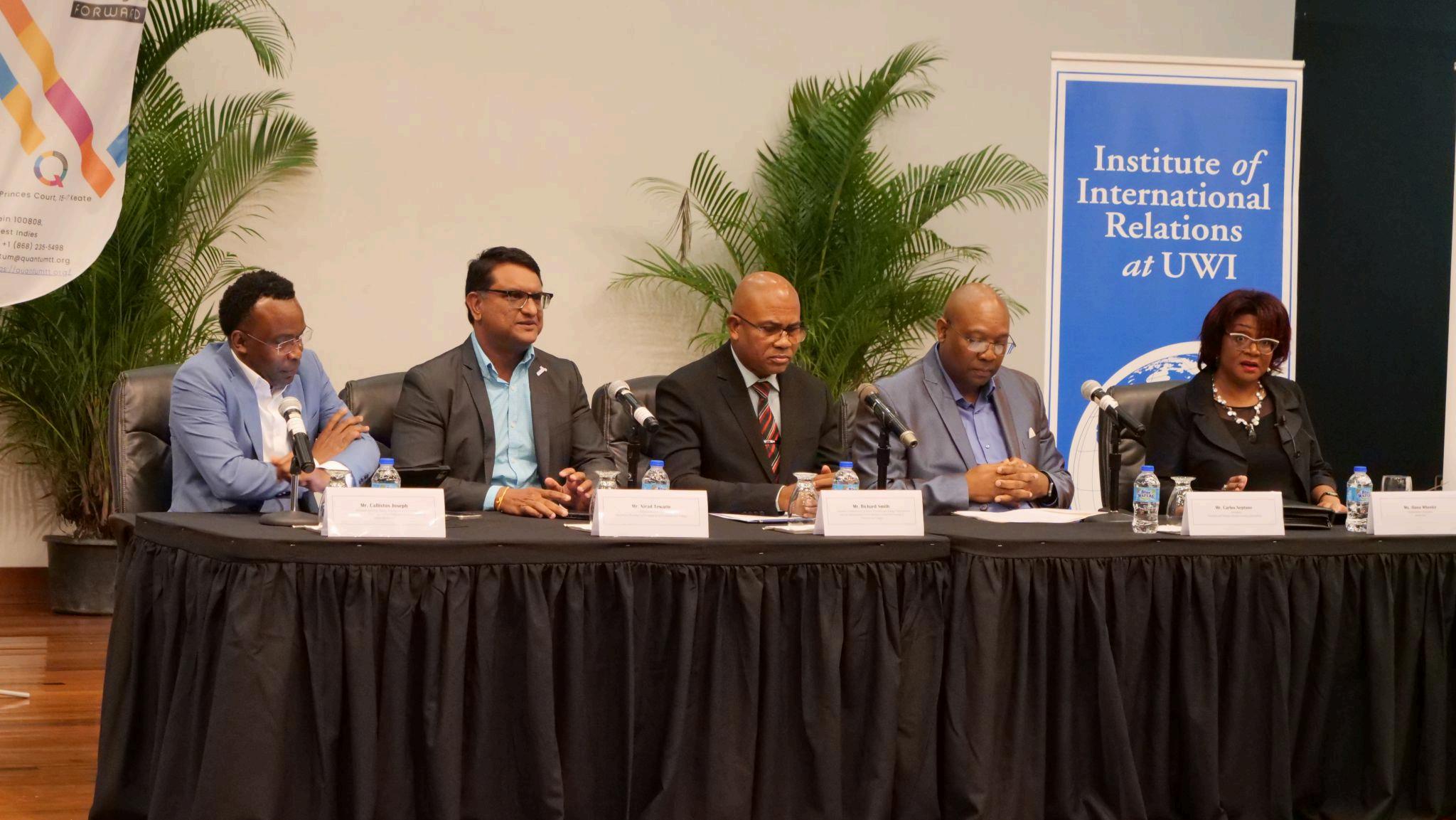
Panellists [L-R] Mr Callixtus Joseph Assistant Director Policy Strategy and Innovation at the CARICOM IMPACS, Mr. Nirad Tewarie CEO, AMCHAM T&T, ACP Richard Smith Head of Operations, TTPS, Mr Carlos Neptune Chairman of TTPSA and Moderator Ms Alana Wheeler
cant size of Trinidad and Tobago’s private security industry comprising approximately 50,000 officers far outnumbering the 6,500 officers in the Trinidad and Tobago Police Service. He stressed the critical need for collaboration, stating, “The private security sector is very, very critical. The state just cannot be everywhere and do it all,” highlighting the importance of leveraging the sector’s resources and expertise to enhance national security.
Mr Callixtus Joseph, Acting Assistant Director of Policy, Strategy, and Innovation at CARICOM IMPACS, strongly advocated for the establishment of a dedicated regulatory authority to govern licensing, training, and industry standards within the private security sector. He emphasised that, “Reform and regulation are critical to increasing professionalism, integrity, and public trust,” and underscored the importance of background checks, mandatory training, and standardised wages as safeguards against criminal infiltration.
Mr Nirad Tewarie, CEO of the American Chamber of Commerce of Trinidad and Tobago (AMCHAM T&T), emphasised that the hallmark of a truly safe society is one that does not rely heavily on the presence of security personnel “Our goal should be to reduce the need for both private security and police officers That doesn’t mean businesses will disappear, but profitability must not come at the expense of society,” he stated Tewarie highlighted that Trinidad and Tobago’s private sector already surpasses global benchmarks in corporate social responsibility (CSR) and expressed a strong willingness to do even more. “We are begging to help more,” he added, calling for deeper collaboration between the public and private sectors to strengthen national security.
The overarching message was clear: fragmented efforts will not solve the crime crisis. The symposium concluded with a united call to move beyond dialogue toward concrete, strategic action involving all sectors government, business, civil society, and academia.

Pan: Musical Chords of Culture That Shape Our National Identity
Tamara Brathwaite, IIR Alumna- Post Graduate Diploma in International Relations
inidad and Tobago officially declared national instrument, a moment of or Trinidadians everywhere. This my curiosity about how national cultural identity worldwide. From ba to the Scottish bagpipes, countries ection to iconic instruments through decrees or national insignia.
Geographical Indication (GI) for "Trinidad and Tobago Steelpan"
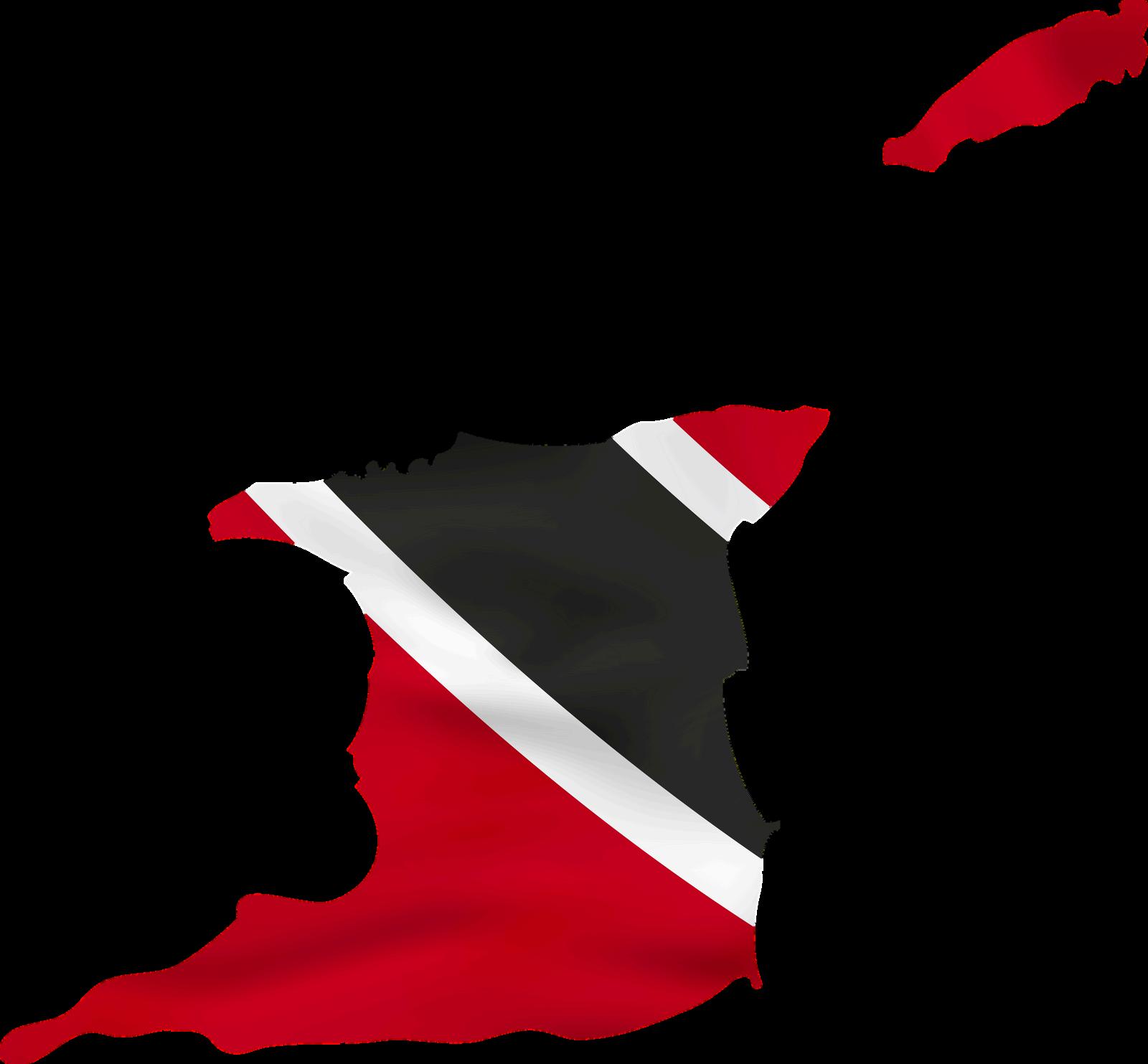

er this historic declaration, Trinidad and Tobago secured a Geographical Indication (GI) for "Trinidad and Tobago Steelpan" through the World Intellectual Property Organisation (WIPO) This means that Pan Trinbago, the GI owner, can prevent unauthorized use of the term in cases where a pan does not meet designated standards As Champagne is to France, Pan can be likened to T&T this ensures authenticity If a steelpan producer wants to use the GI, they must meet Pan Trinbago’s standards
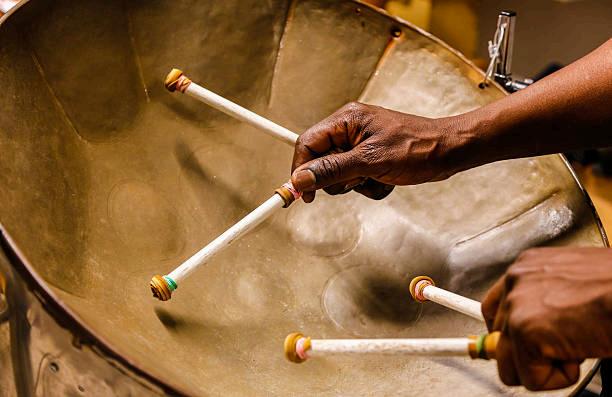
strengthening its intellectual property protections. Since joining the Madrid System for the International Registration of Marks on October 12, 2020, it has been possible, as of January 12, 2021, to designate Trinidad and Tobago in an international trademark application under the Madrid System. This development allows for broader brand protection and ensures that original steelpans can carry an official “Made in Trinidad and Tobago” stamp, reinforcing authenticity in global markets
Though its official status is recent, the steelpan has long been celebrated as the only musical instrument invented in the 20th century As a Trinbagonian, my passion for the steelpan runs deep Pan music was a constant in my

home - played by my mother in her youth, my brother in school competitions and now by my niblings Its metallic, rhythmic tones, created by rubber-tipped sticks striking the steel drum, come alive most vibrantly during our Carnival celebrations Just a year before its national recognition, it gained global acclaim with the United Nations declaring 11 August as World Steelpan Day, highlighting its global impact and historical significance.
But how do we ensure the steelpan’s legacy endures? WIPO plays a key role in protecting both the instrument and the traditions that surround it. In 2022, WIPO supported the Carnival Museum of Trinidad and Tobago in developing an intellectual property (IP) strategy to help festival organisers protect Carnival’s music, performances, costumes and art, securing their cultural and commercial sustainability. Yet, it is no secret that challenges remain. The steelpan has faced IP disputes over production methods, while mass-produced versions threaten authentic craftsmanship.
Declaring national instruments isn’t just about pride, it’s about preserving cultural legacies While WIPO’s initiatives provide protection, continued innovation and global recognition are essential to ensuring that the steelpan remains authentically and uniquely Trinidadian
I am inspired by how deeply we revere our national instrument: from a single person in the form of Joshua Regrello’s world-record pan marathon to the countless supporters of pan across our twin-island nation and beyond The steelpan blends tradition with progress, history with innovation and rituals with rhythms It moves us in unison, reinforcing the musical chords of culture that shape our national identity
STUDENT ENHANCEMENT
Research Symposium
The Institute of International Relations was proud to present its Research Symposium and Career Expo, an event created to elevate our students' academic journey and career readiness Our goal was simple: help students succeed in their studies and enhance their future job prospects.
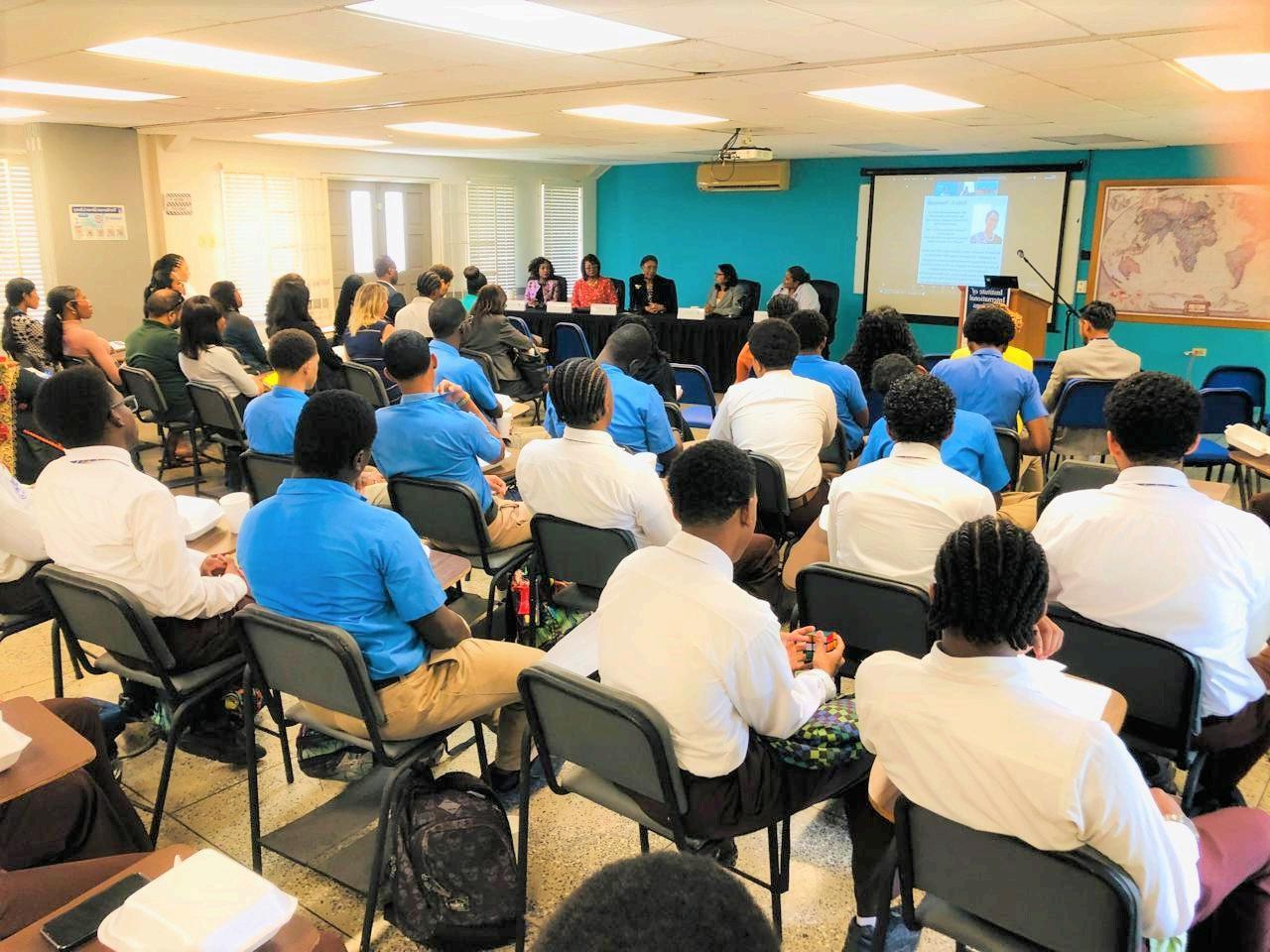
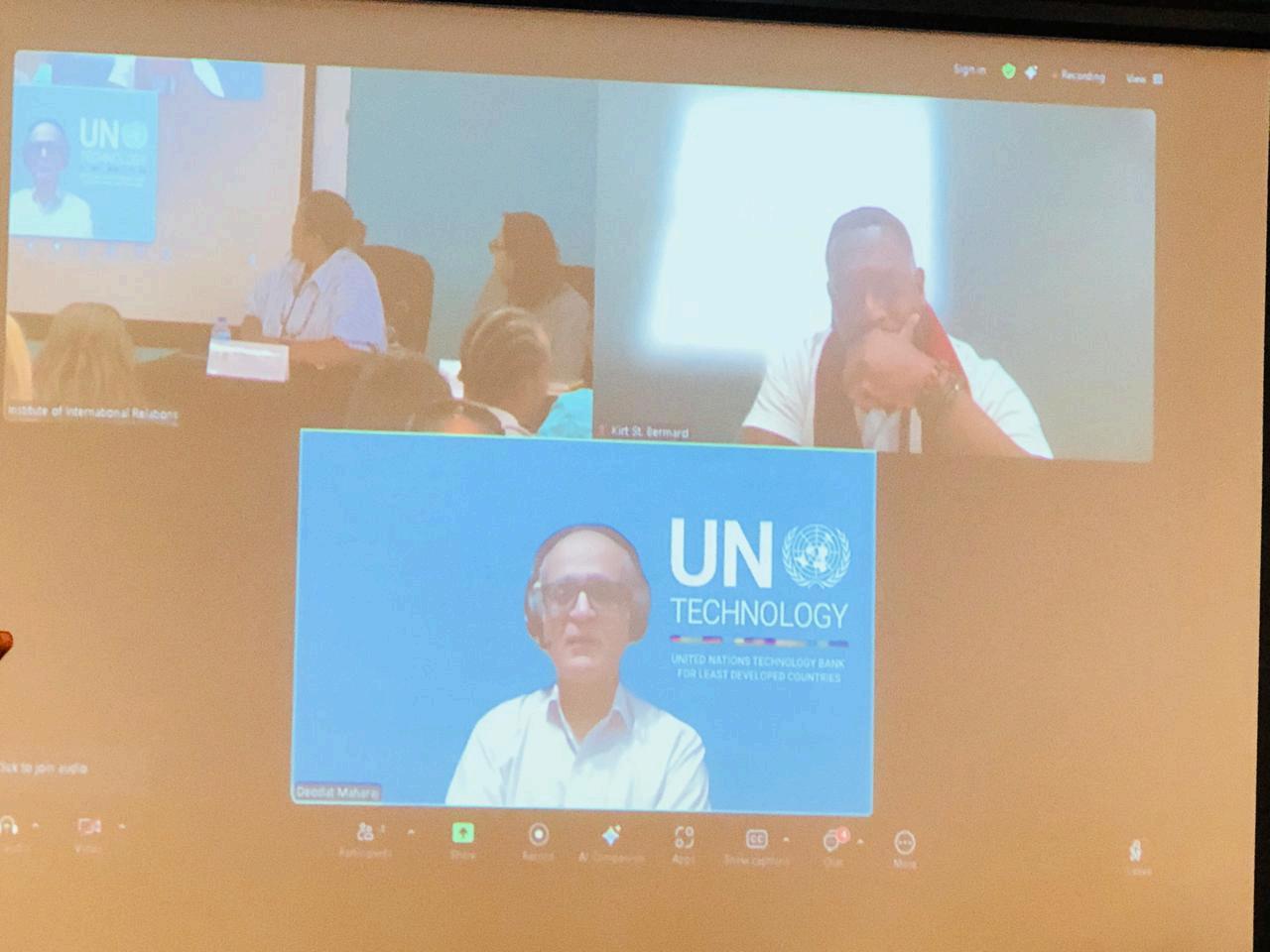
January 22, 2025
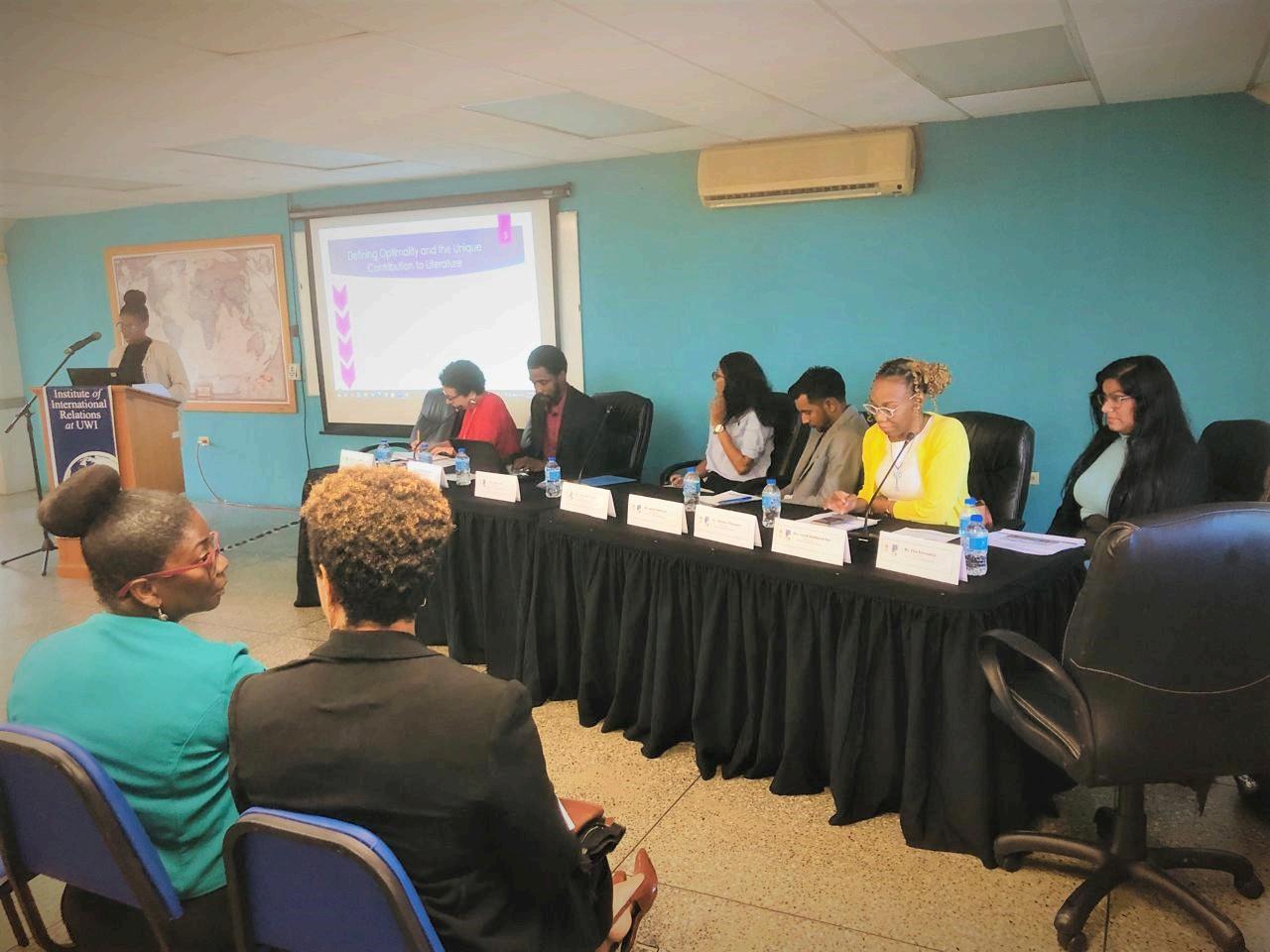
get constructive feedback, and be part of a supportive research community that promotes collaboration with faculty. It also served to highlight new trends in International Relations. Beyond academics, the expo was key for connecting students with employers, mentors, and alumni, offering insights into internships and job openings, and allowing them to engage directly with professionals about careers in the International Relations field

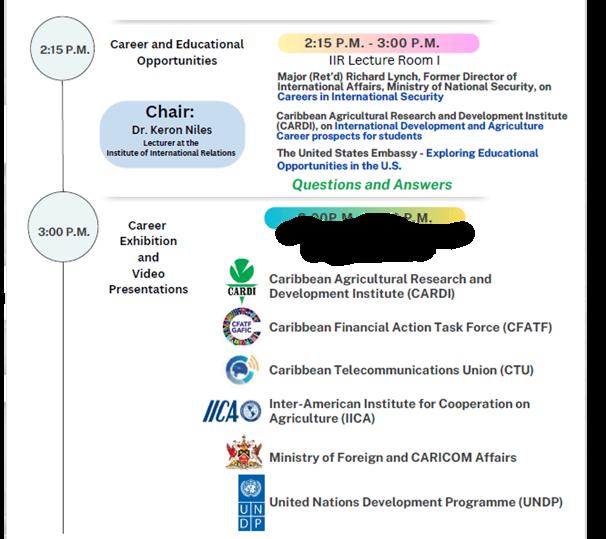
Patrons were also presented with insights and information from various organisations that shared their specialised knowledge and showcased their products and services Pictured at right and below
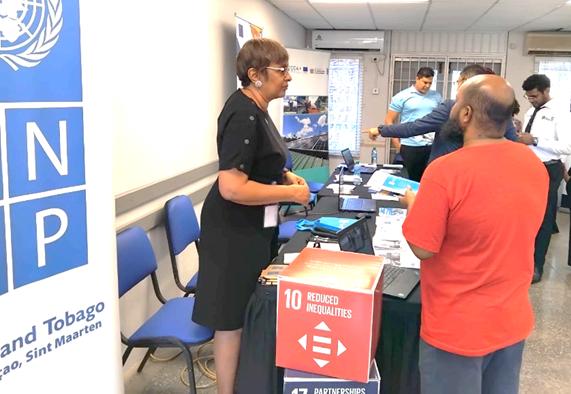
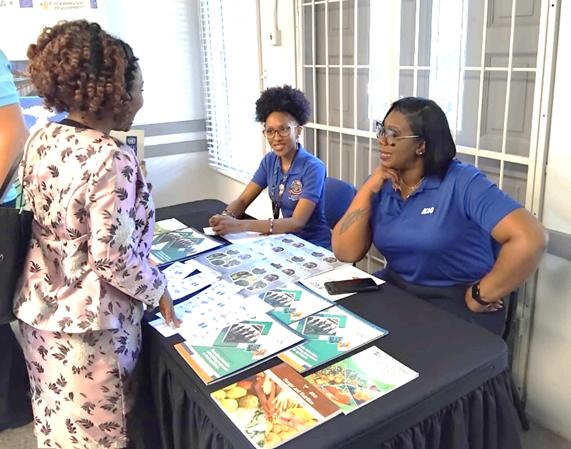
STUDENT ENHANCEMENT
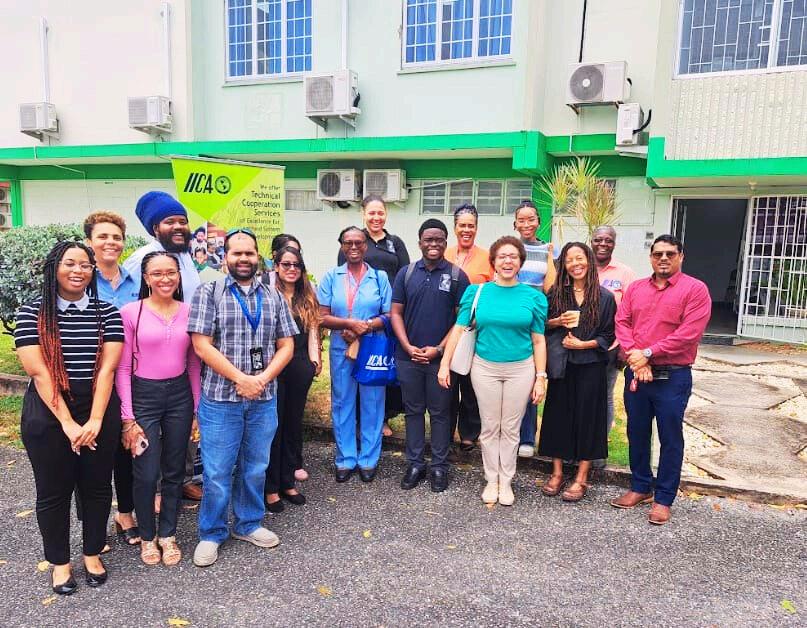
Field Trip to The Inter-American Institute for Cooperation on Agriculture (IICA)
March 25, 2025
Dr Laguardia and the students of the Institute of International Relations (IIR) had the distinguished opportunity to attend a session organised by the Inter-American Institute for Cooperation on Agriculture (IICA). The IICA serves as the specialised agency within the InterAmerican System dedicated to promoting agricultural development and rural well-being across its Member States. Through its initiatives, IICA supports regional efforts to advance sustainable agricultural practices, enhance food security, and foster economic growth in rural communities throughout the Americas.
Diplomatic relations between Trinidad
and Tobago and Korea
On Tuesday 3 June 2025, a small cohort of 4 students and 3 staff members were invited to a special panel discussion event commemorating the 40th anniversary of diplomatic relations between Korea and Trinidad and Tobago, established in 1985 The topic discussed was, ‘Trends in Caribbean Countries’ Policies and Economies toward the Foreign Policies of the U S and China’
June 3, 2025
The discussion explored emerging trends in regional policy and economic alignment, reflecting the nuanced recalibration of Caribbean foreign relations in a rapidly changing global order. This event marked the beginning of a series of initiatives aimed at exploring new avenues for mutual development and cooperation between our countries

Pictured above, students and staff who attended the panel discussion event commemorating the 40th anniversary of diplomatic relations between Korea and Trinidad and Tobago, established in 1985
Ms Terez Lord, Dr Keron Niles, Dr Jaqueline Laguardia, Dr Dave Serrattan, Mr Seijoong Kwon, Ambassador-Designate of the Republic of Korea to the Republic of Trinidad and Tobago, Mr Yassim Edoo, Mr Alana Kling, Ms Danita Dass, Ms Amaiya Carrington, Ms Deborah, Mr June from the Korean Embassy
Who Should Fund Civil Society?
The USAID Closure Forces an Uncomfortable Conversation
Diana Thorburn, IIR Alumna - MSc Global Studies
Who should fund civil society organisations (CSOs)? This question has long loomed over Jamaica’s nonprofit sector, but the sudden withdrawal of USAID funding has made it unavoidable
For organisations like CAPRI, this shift highlights a persistent dilemma While our core funding comes from local private companies, most of our project funding comes from foreign donors both government and private philanthropy Most other Jamaican CSOs, however, are entirely dependent on foreign funding
The real challenge is not just the loss of USAID funds it is that much of civil society has been built on the assumption that foreign donors will always sustain it
If not them, then who? The private sector cannot be expected to fund a civil society sector whose size has been inflated by foreign aid. Corporate social responsibility budgets can only go so far, and businesses tend to prioritise direct social impact over research, advocacy, or accountability work. State funding risks compromising
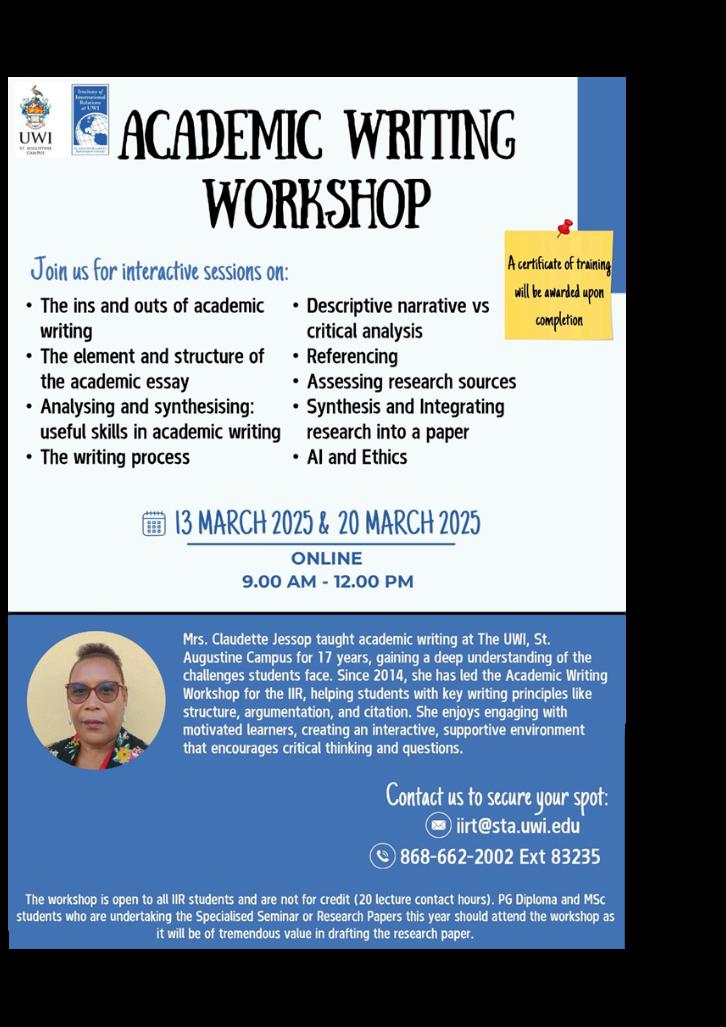
CSOs’ independence, especially in governance, anticorruption, and human rights advocacy
Beyond the immediate funding gap, there is another question: has sustained foreign aid distorted civil society? Large inflows of external funding have fostered special interest groups that exist only because of aid, rather than delivering real impact Entities reliant on foreign donors risk being out of touch with local needs, and some may not even be useful In the United States and Europe, independent research and advocacy organisations benefit from philanthropic foundations, alongside government project funding Does the Caribbean have the kind of private wealth to sustain such a model? Do governments see the value in outsourcing research or social projects? The USAID closure has not just pulled funding it has forced a reckoning with civil society’s financial and operational models and its actual value to Caribbean societies.
IIR EVENTS

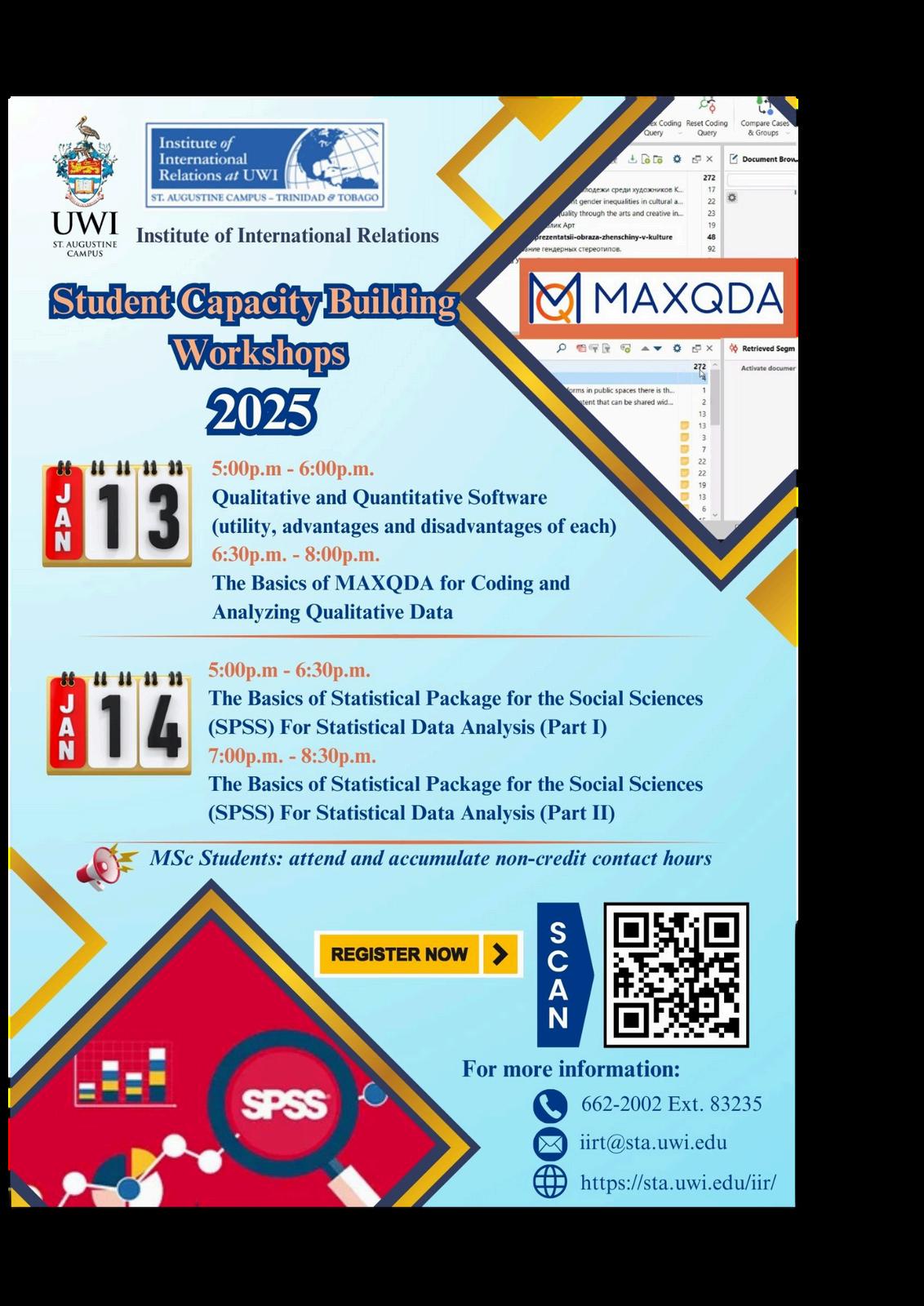
COMMUNITY OUTREACH
The Institute of International Relations (IIR) had the honor of participating in the University’s Open Day events, held on May 17-18, 2025 During this occasion, the Institute's booth served as an informational and engagement hub, welcoming prospective students and visitors to explore the Institute’s academic offerings and opportunities Attendees were provided with comprehensive insights into the Institute’s programmes, research initiatives, and extracurricular activities Additionally, the booth featured interactive activities and knowledge-based games, designed to challenge and enhance visitors’ understanding of international relations and related disciplines
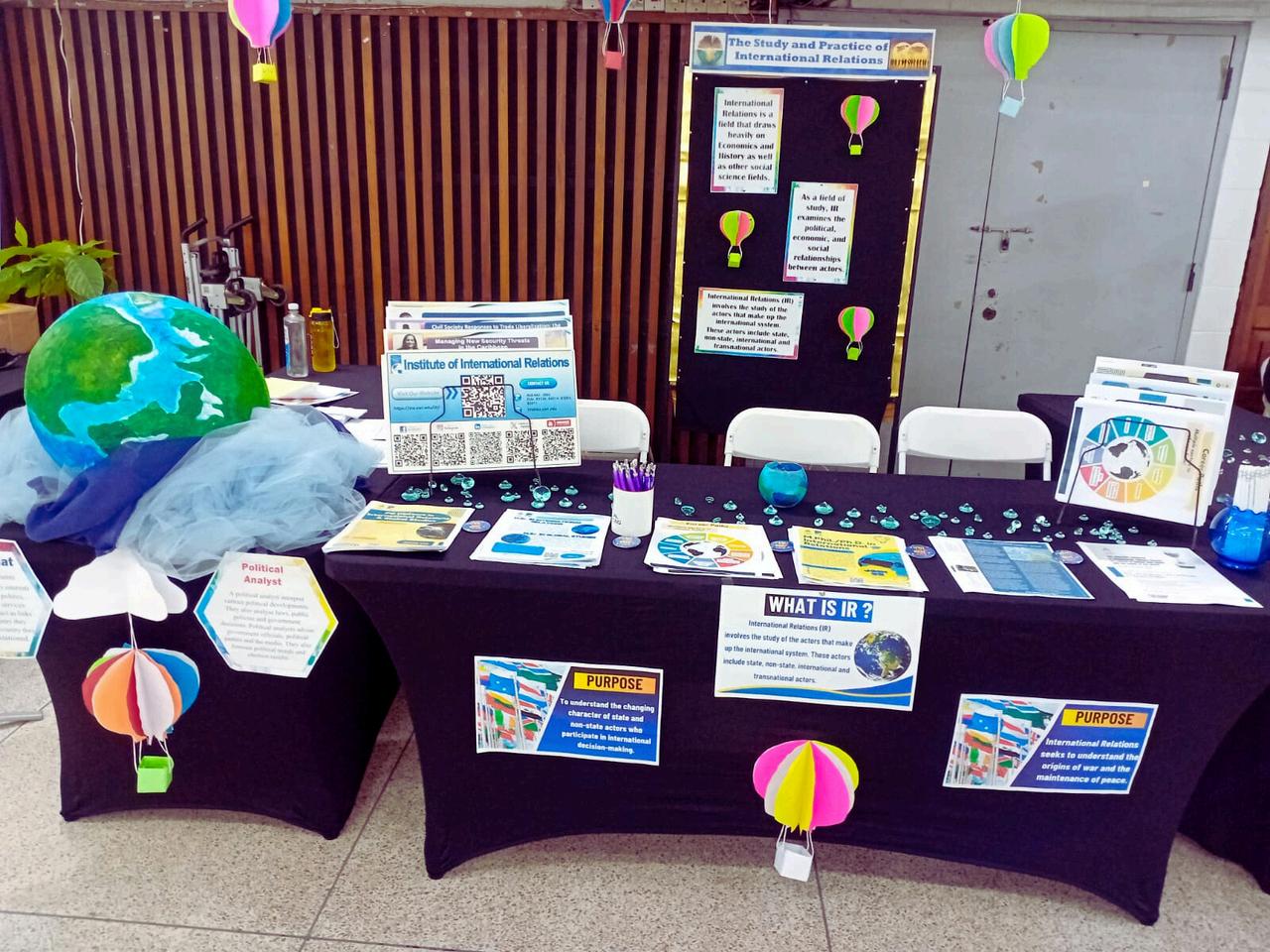
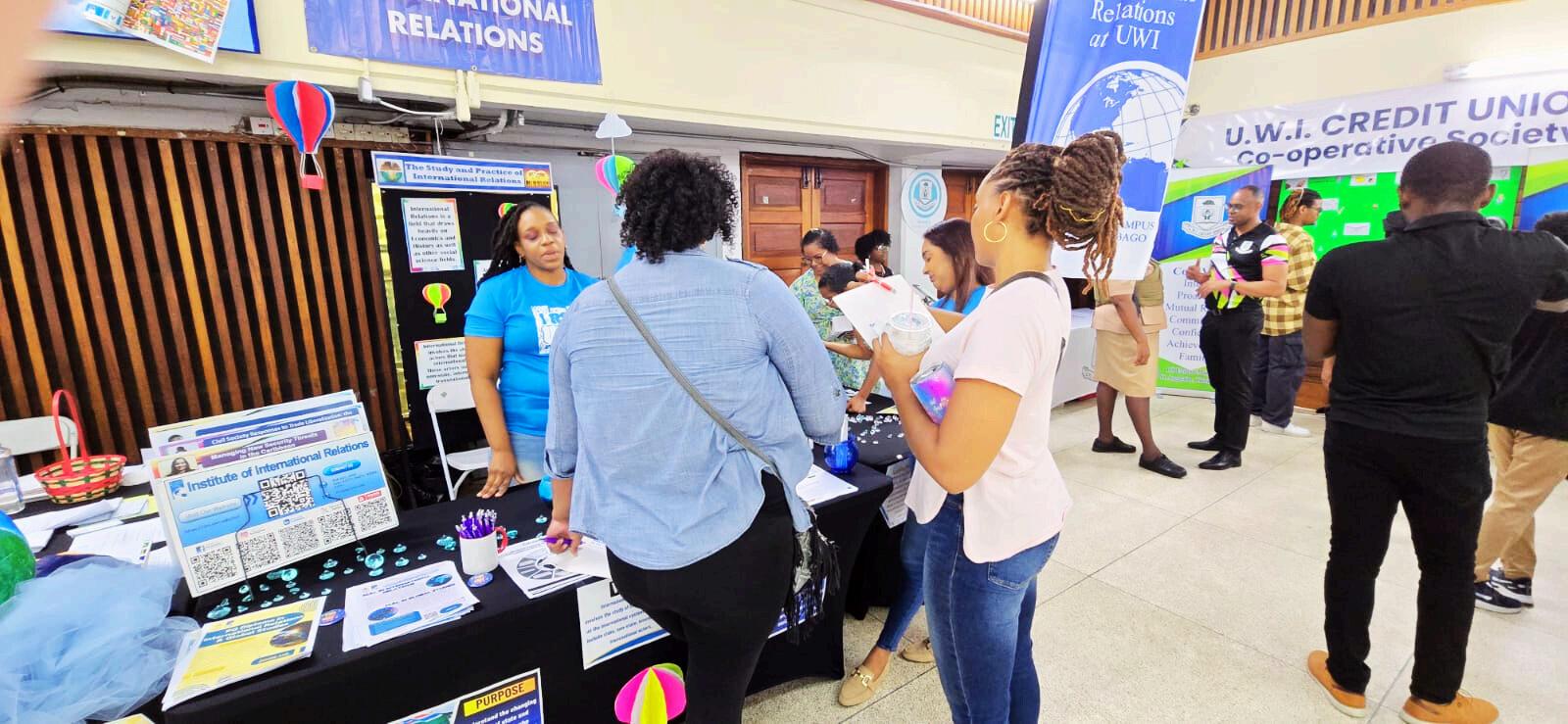
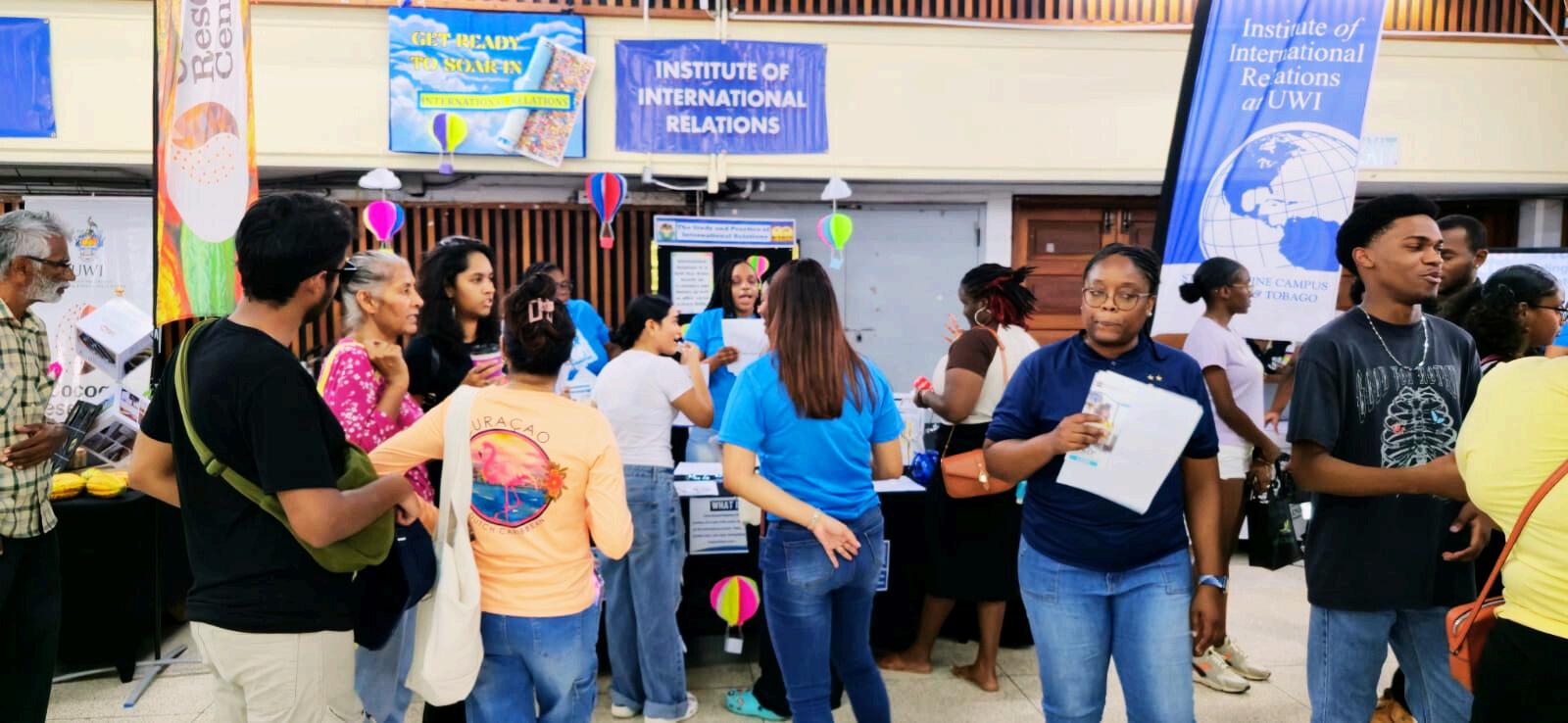
WTO REGIONAL TRADE POLICY COURSE

The World Trade Organization (WTO) Regional Trade Policy Course, hosted by the Institute of International Relations, concluded after eight intense weeks of training. The program brought together 21 government officials from 13 developing WTO member countries.
SUBMITTED ARTICLES
Disrupting Discourse: Trump’s Education Agenda & Caribbean Consciousness
Dr. Shilohna K. Phillanders
IIR Alumna-MSc Global Studies
Within less than a month, the 2025 Trump administration caused major shifts in United State’s (U.S) education policies. Given the region’s history, U.S policies oftentimes spills over into the Caribbean, prompting the question – what will the impact be? There are clear implications on the policies related to curriculum content and critical discourse. For context, the reinstatement of the 1776 Commission in the U S rebuilds nationalism curriculum content; though seemingly harmless it can potentially erase histories of marginalised persons and their voices in hard fought political discourses (Binkley, & Miller, 2025) It furthermore rejects critical theories, including that of critical race theory and other post-modernist discourse which prioritise underrepresented voices Interestingly enough, the Trinidad and Tobago Ministry of Education’s Patriotism Policy 2023-2027 has gained public traction this year with growing national and global recognition of the steelpan and the drive to reinforce its relevance in national curriculum The policy, can be said to bear similarities with current U S re-

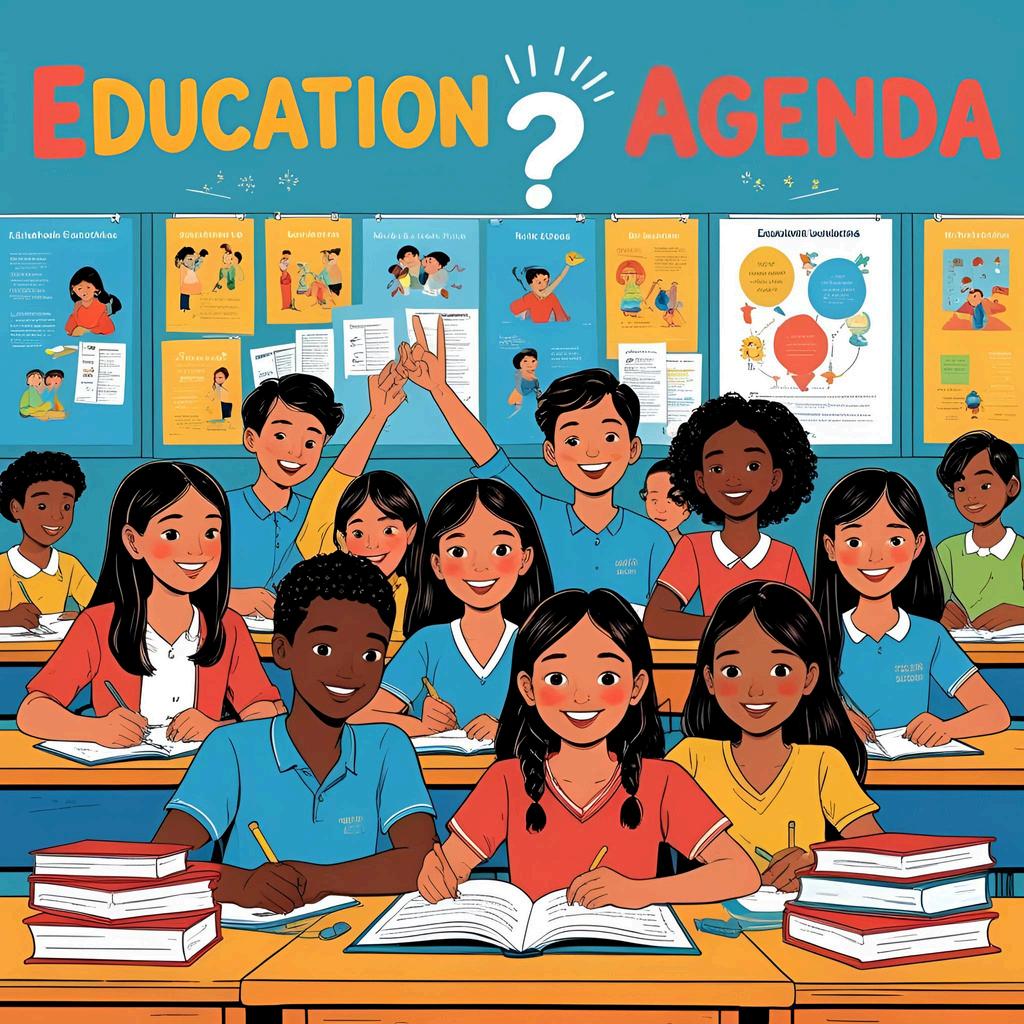
commitment to promoting nationalism through educational curriculum reform. Caribbean nations have long included national identity in their education policies to address historical and systemic issues. Jamaica’s use, to aid in combating criminality; a sense of national pride to give hope, being one such example. Similarly, CARICOM’s perspective on nationalism and regionalism working together as a tool for peace and social cohesion in our region
The fostering of national cultural pride is vital to our region; individually we have lots to be proud of We however must be wary of nationalistic overemphasis
This can potentially weaken CARICOM’s integration efforts through eroding critical engagement with our shared histories The region’s individual national educational agencies must balance curricula that cultivates national pride while supporting conversations that create informed, regional citizens who are not passive recipients of state-approved narratives Critical discourse even in patriotism is vital!
US and Venezuela Relations: The road to reconciliation?
Avery Durham IIR Alumna, MSc Global Studies
Nicolás Maduro and Donald Trump were both declared victors of the Presidential Elections in Venezuela and the United States of America (USA) respectively in 2024 It is not the first time that both Presidents have assumed roles concurrently In their previous administrations, the two leaders have been at loggerheads due to their vastly differing political ideologies. Therefore, what do these newly inaugurated administrations mean for each other? There seems to be a subtle shift in relations between the two states. By way of illustration, US envoy Richard Grenell’s visit to Caracas in January 2025 proved successful as negotiations were made with President Maduro for the release of six Americans who were accused of attempting to destabilise Venezuela. Furthermore, Trump’s immigration policies have taken full effect. This has been exemplified in the case of two hundred Venezuelans who were deported from the US in February 2025
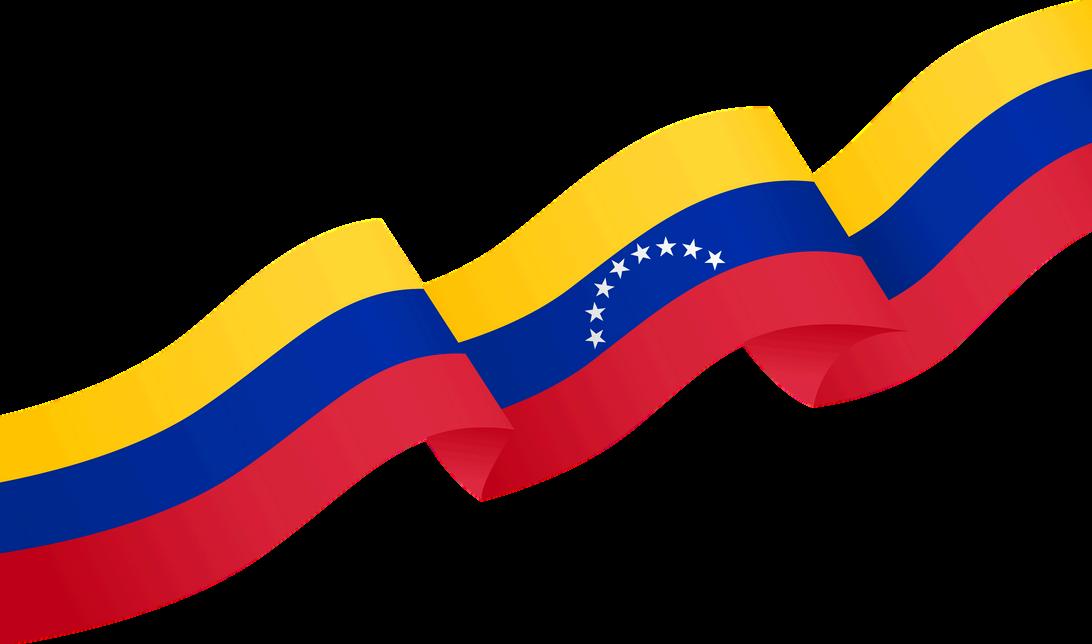
Venezuela collaborated with the US by providing two planes to assist Trump’s deportation exercise. At this point, it appears that such interactions between the two states are working primarily in favour of the US. It is not a “win-win” situation, however it seems as though Maduro is trying to stay on the good side of President Trump to secure future benefits for Venezuela, perhaps a possible roll back of US sanctions
This subtle shift in the dynamics between the two states are influenced by self-interest. Both leaders are treading carefully where each other is concerned; yet still upholding their political ideologies In order for relations to improve between the US and Venezuela, both states must develop a pragmatic approach within their interactions rather than one that is forcefully ideological. If this present situation is really the road to reconciliation between the two states, the journey will be a long one.
DIPLOMATIC DIALOGUE
June 16, 2025
Multilateralism in the face of the current major global crises France pushes for change at the UN
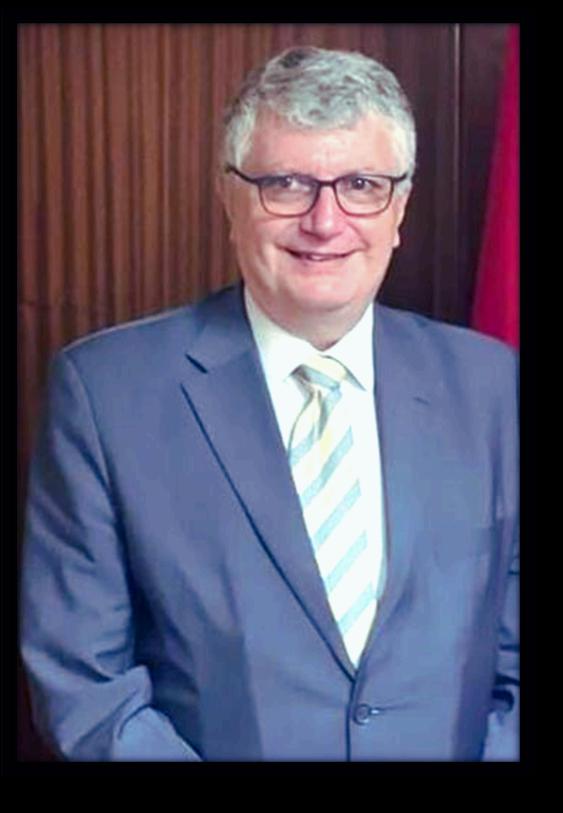
During a diplomatic dialogue focused on climate change, regional stability, peace, and security hosted by the University of the West Indies' Institute of International Relations, The French Ambassador to Trinidad and Tobago has called for responsible and collective action from the global community to avoid creating further disaster for the next generation
This dialogue was presented by H E Didier Chabert who provided sound insights into the evolving architecture of global governance and to explore the future trajectory of international collaboration in an era marked by unprecedented challenges
In his address, Ambassador Didier Chabert emphasised the urgent need to revitalise and reform global multilateralism noting its effectiveness has never been more critical than it is today.
He said France proposed reform which aimed to fundamentally change the structure and operational rules of the United Nations Security Council, particularly through the expansion of its permanent membership assigning permanent seats to African countries.
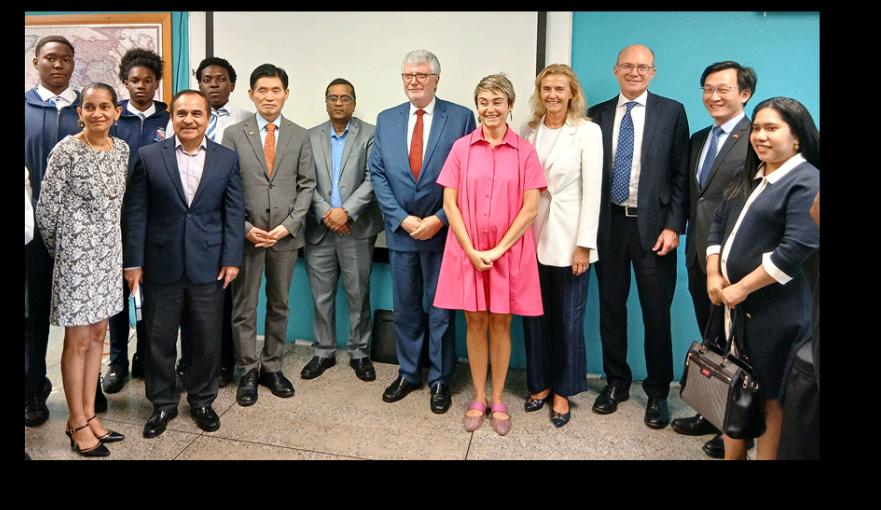
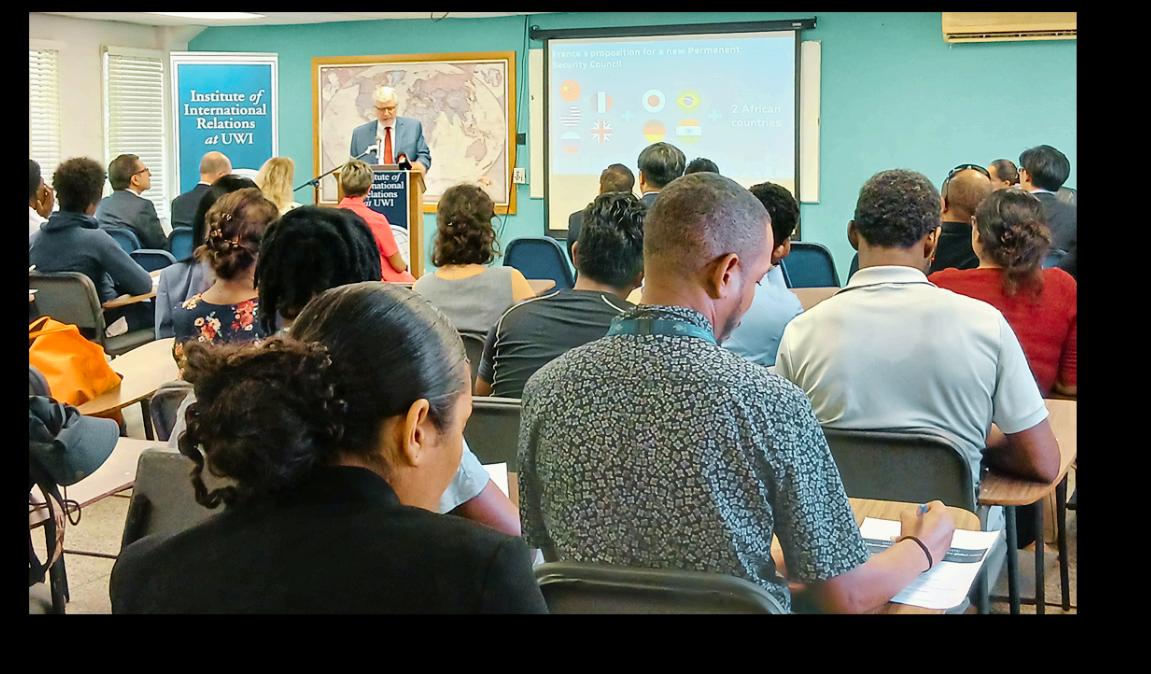
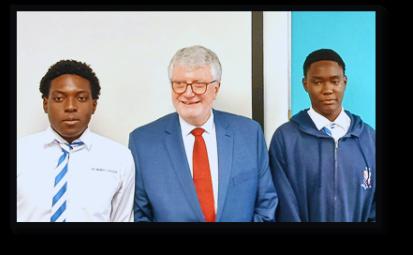
LATIN AMERICA FORUM
I am Latin America Highlights from the Latin American Forums at the Institute
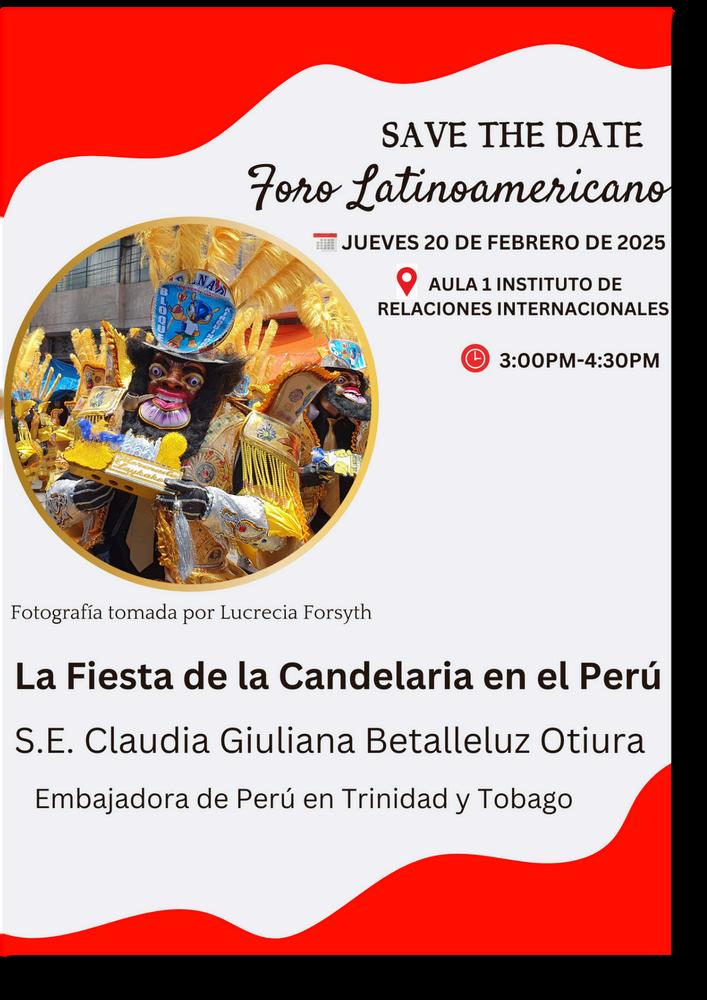
The first Latin American Forum (LAF) for 2025 featured H.E. Claudia Giulana Betalleluz Otiura, Ambassador from the Embassy of Peru, on February 20, 2025, who spoke about the Festival of Candlemas in Peru Candlemas occur every year in the city of Puño in Peru on February 2, 2025 This festivity is quite integral to the cultural and religious aspect of Peru’s tradition The presentation of this festivity pays homage to the veneration of the Virgin Mary This festival mirrors Trinidad and Tobago’s Carnival, in terms of the vibrant colours and breathtaking artisanal work done on the garments worn during the festive period
H E Hernán Núñez Montenegro, Ambassador from the Embassy of Chile was the featured speaker at the Latin American Forum (LAF) held on March 25, 2025 His topic was the Presence of Chile in the Asian-Pacific: Historical, Diplomatic and Commercial Aspects He spoke to Chile being a direct link to the Asian-Pacific historical since 1843 and the region was notable the gateway of commercial trade before the Panama Canal in the 19th century Further on the diplomatic front, he noted that Japan most of the Asian countries are Pro-Chile which augurs well in terms of commercial integration and the development and competitiveness of its economy among other accruing benefits

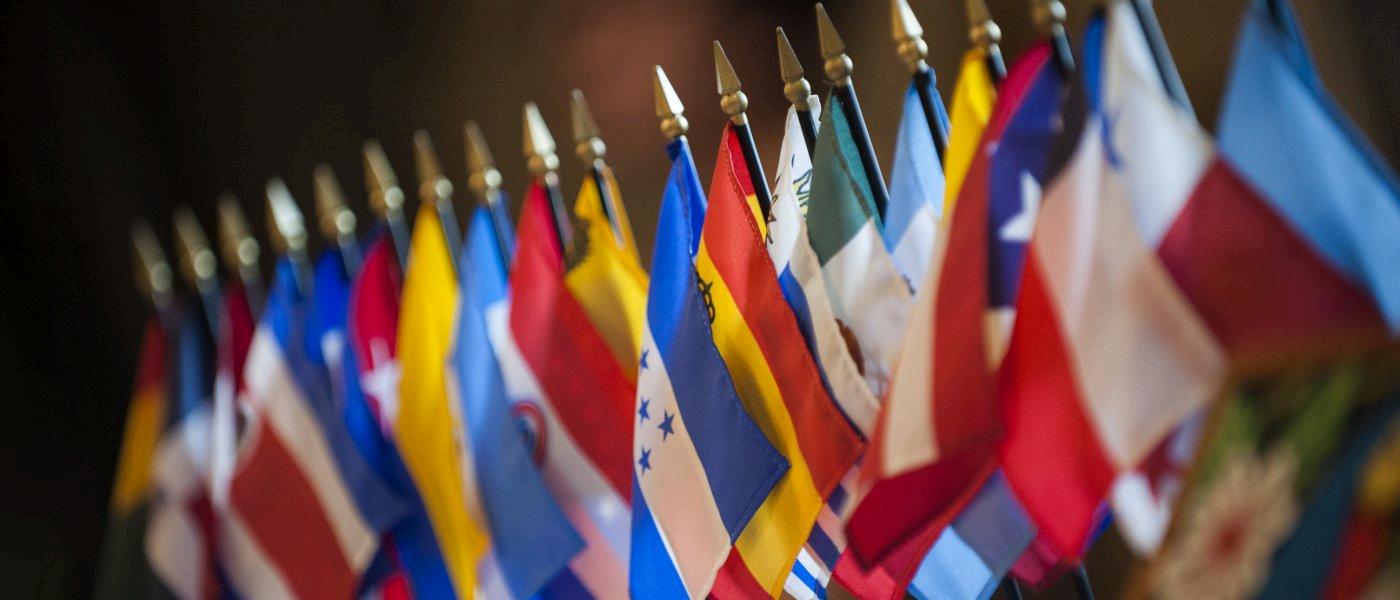
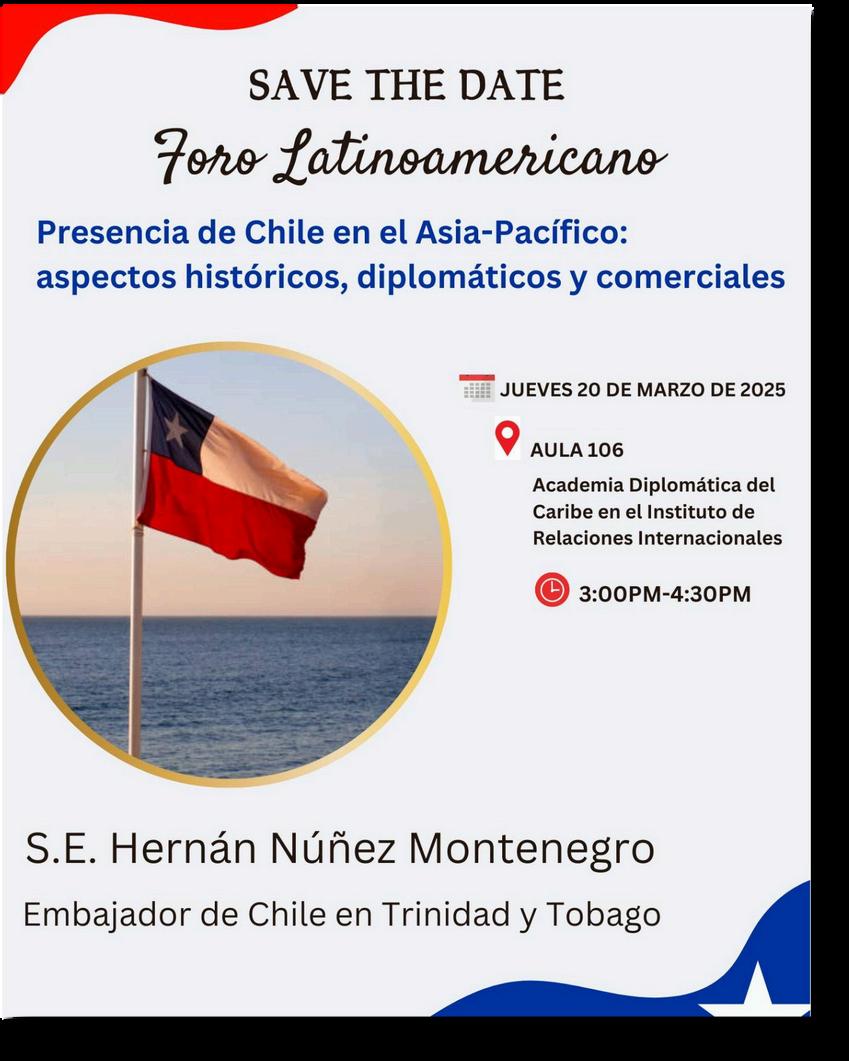
The final Latin American Forum (LAF) for the UWI Academic Year 2024-2025 was held on May 15, 2025 The distinguish speaker was Dr Nicole Roberts, Senior Lecturer in Spanish and Director of the Centre for Language Learning (CLL) at the UWI St. Augustine Campus. The topic of discussion was “the cultural journey into language”. Her focus was to bring awareness to the representation of the power of languages, which has had the advantage of creating economic and educational ties within countries across the world. Additionally, Dr. Roberts’ brought attention to her latest publication, "Unearthing Traditions: Stories of Language and Culture" (editors Nicole Roberts and Janine R. Lutchman, Brainstorm Press, 2025) which is a new collection of narratives aimed at highlighting identity, promoting inclusivity, and preserving cultural heritage across the Caribbean.
THE NORMAN GIRVAN LIBRARY
HIGHLIGHTS
The Norman Girvan Library continued to serve as a vibrant hub for learning, research, and academic engagement. During the period, January to June 2025, the library featured a series of informative displays, welcomed several distinguished visitors, acquired book donations and hosted a workshop designed to benefit and empower our students. These activities reflect our ongoing commitment to supporting the academic community.
Monday, February 17, 2025
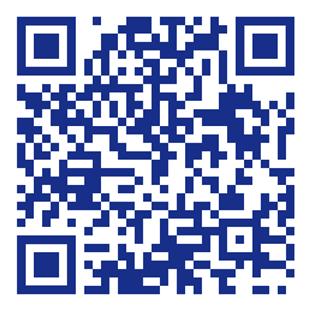
Saturday, April 5, 2025
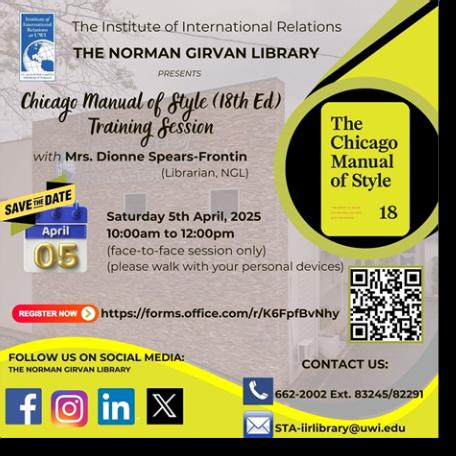
Monday, May 19, 2025
Pictured (L to R): Mrs Dionne Spears-Frontin (Librarian, Norman Girvan Library), Dr Annita Montoute (Acting Director, Institute of International Relations, The UWI), H E Ambassador Noemí Espinoza Madrid (Secretary-General, ACS), and Dr Nand C Bardouille (Manager, The Diplomatic Academy of the Caribbean, DAOC)
Monday, February 25, 2025
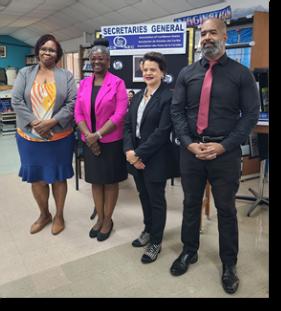

Director
Mr. Juan Chebly, Consultant for the Strategic Vision at the Association of Caribbean States (ACS), visited the Norman Girvan Library on Tuesday, February 25, 2025, accompanied by Ms Sarah Hosein
Tuesday, March 18, 2025
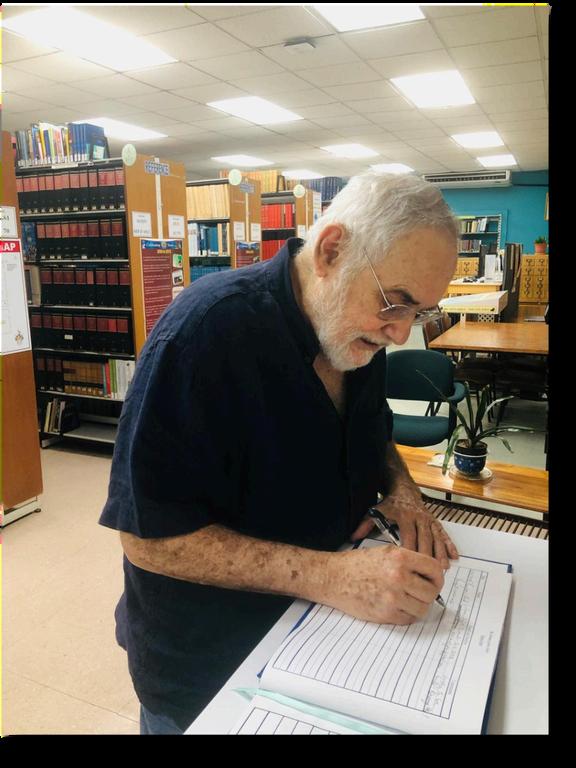
(L to R): Mrs Saara Browne, IFRC: Coordinator, Planning and Partnerships Teams; Dr Annita Montoute, IIR Acting Director; Mrs Dionne Spear-Frontin, Librarian, The NGL and Ms Renee Thomas, IFRC, Manager- Caribbean Disaster Risk Management Reference Center
BOOK DONATIONS
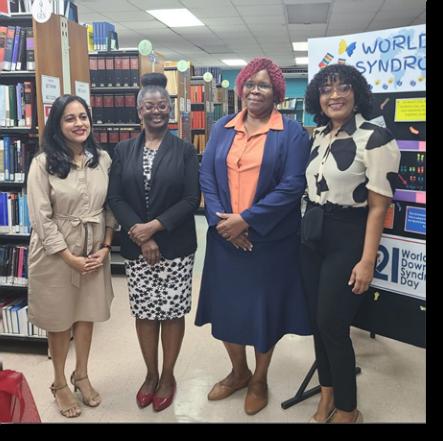
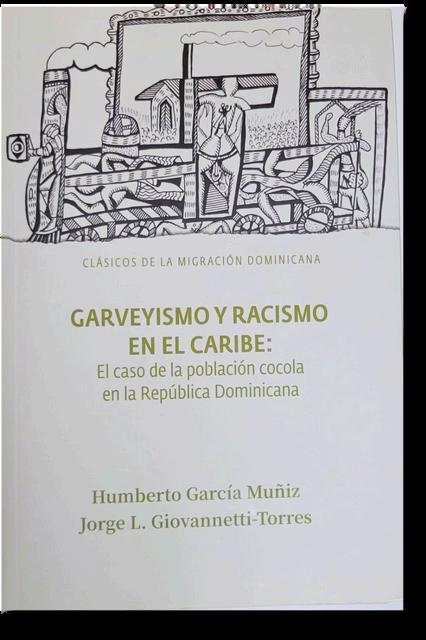
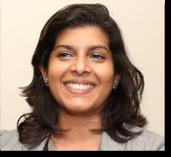
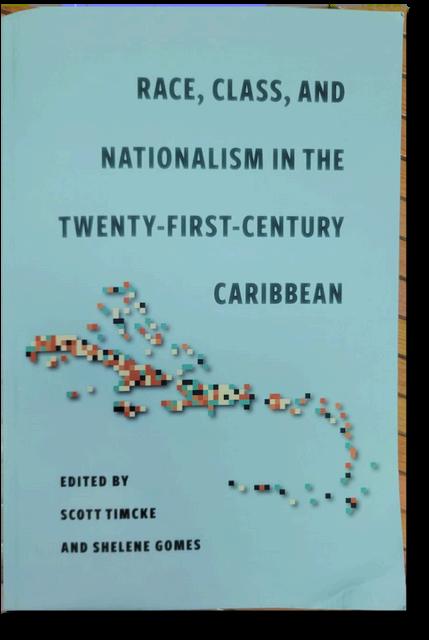
Some of the displays for the period Jan-Jun 2025
